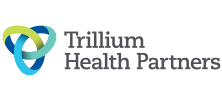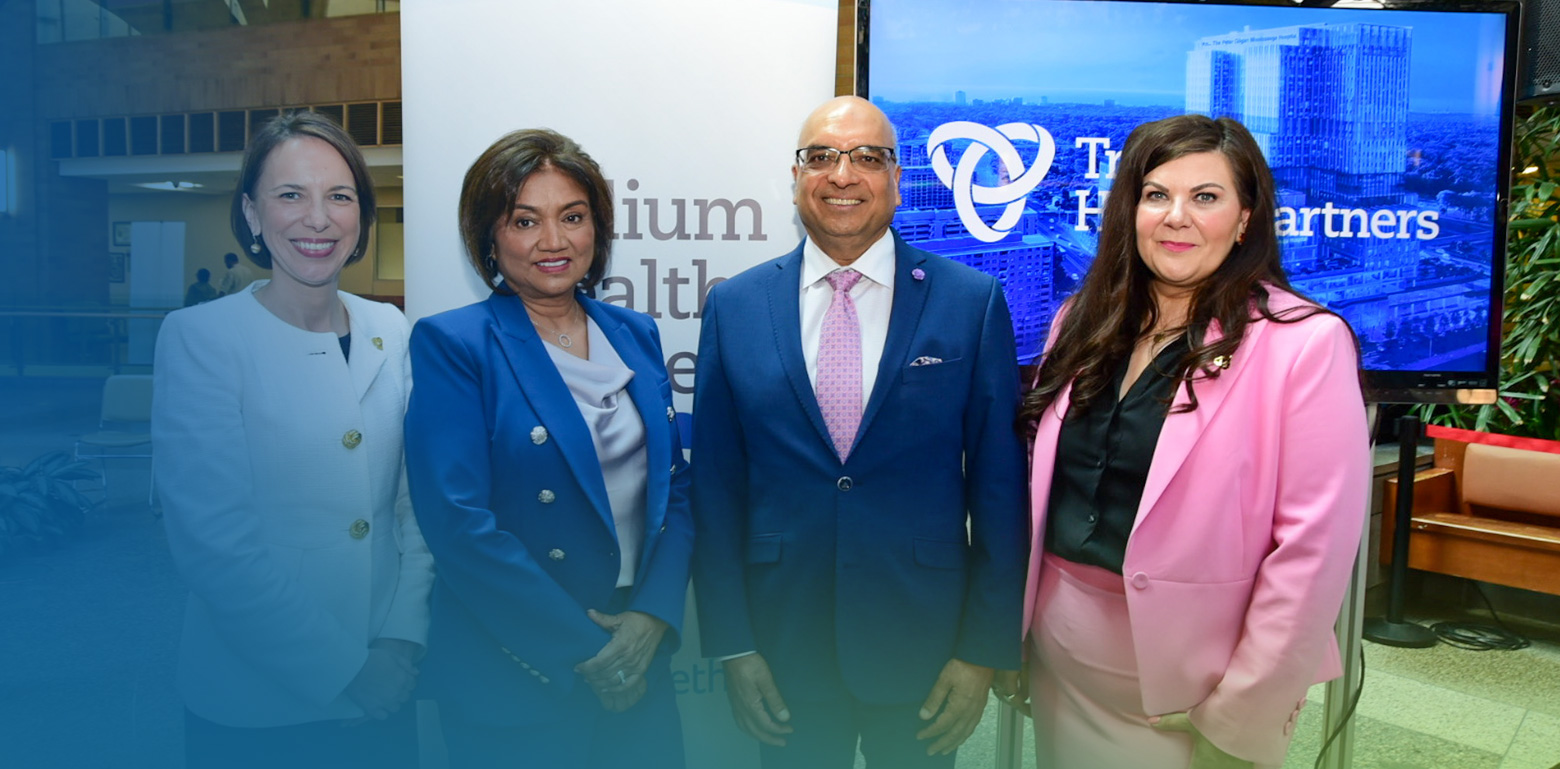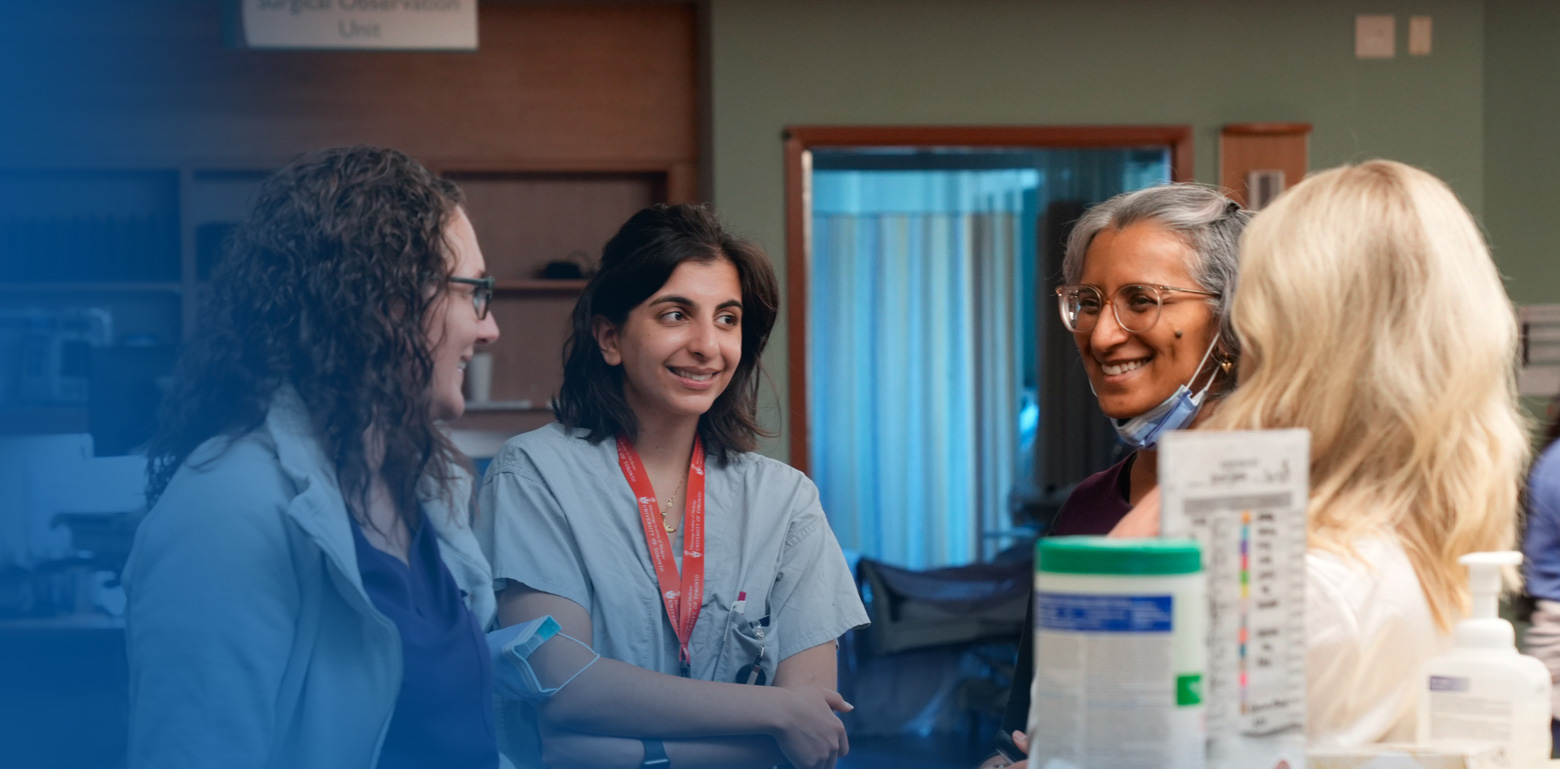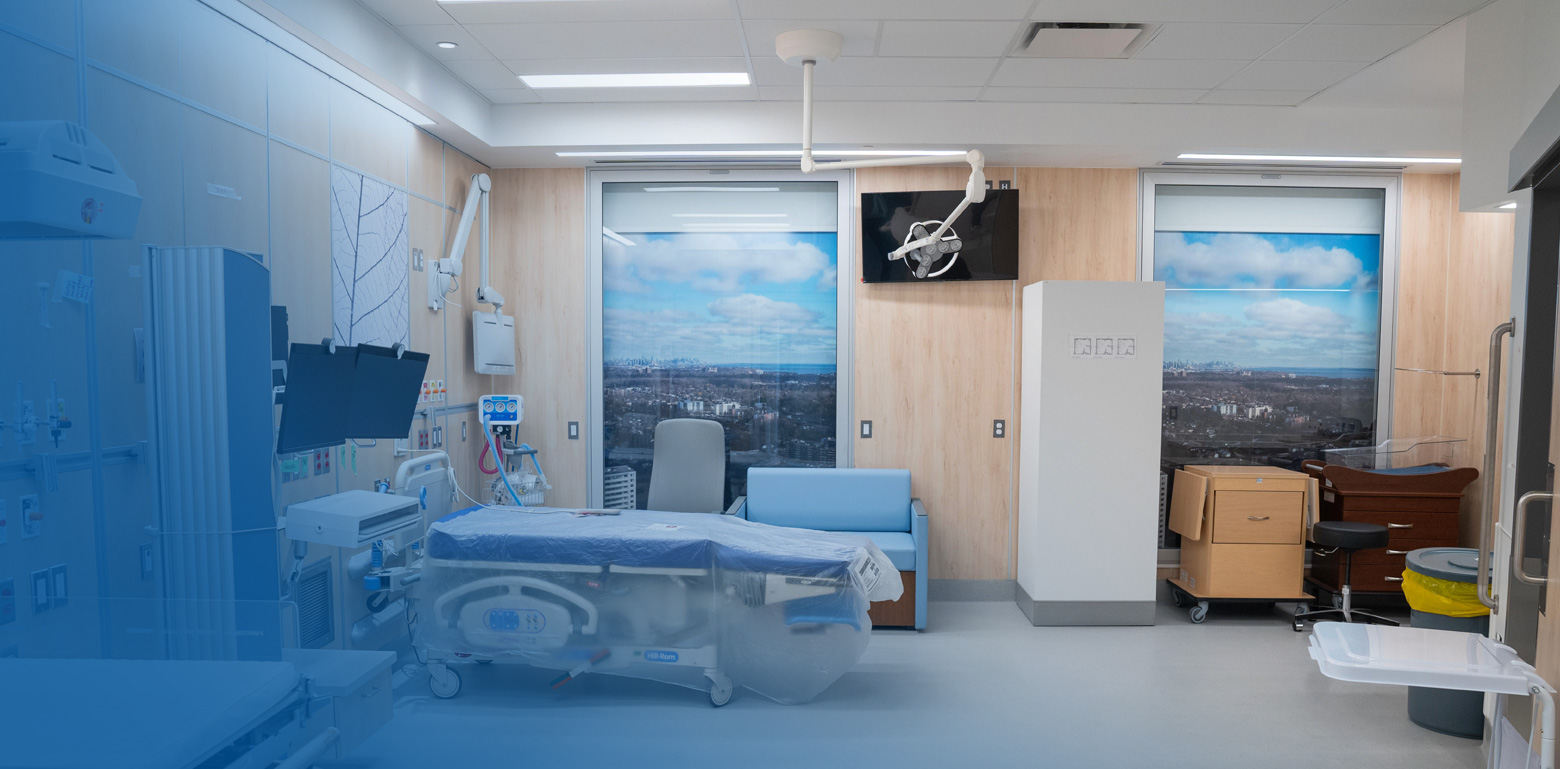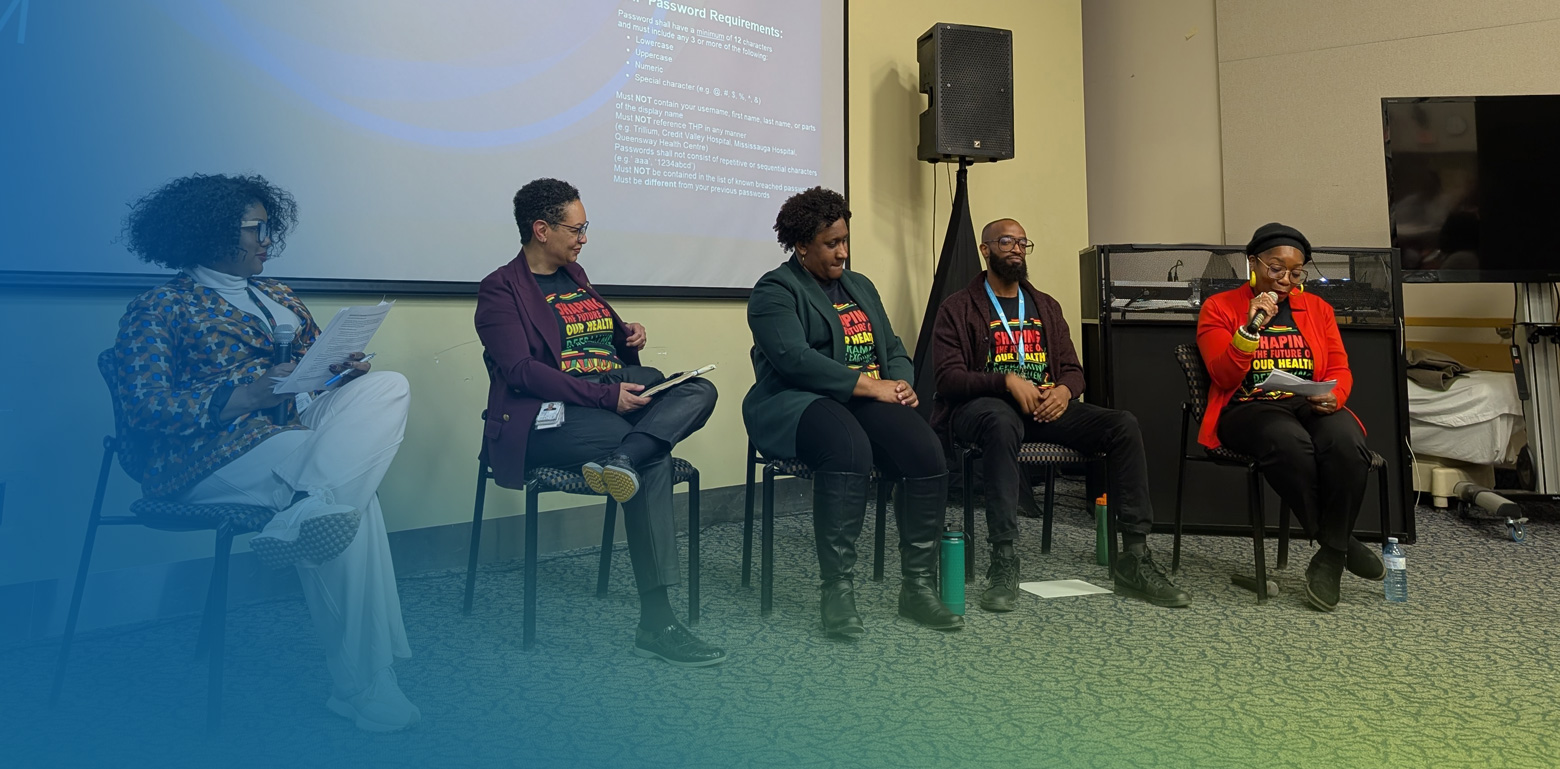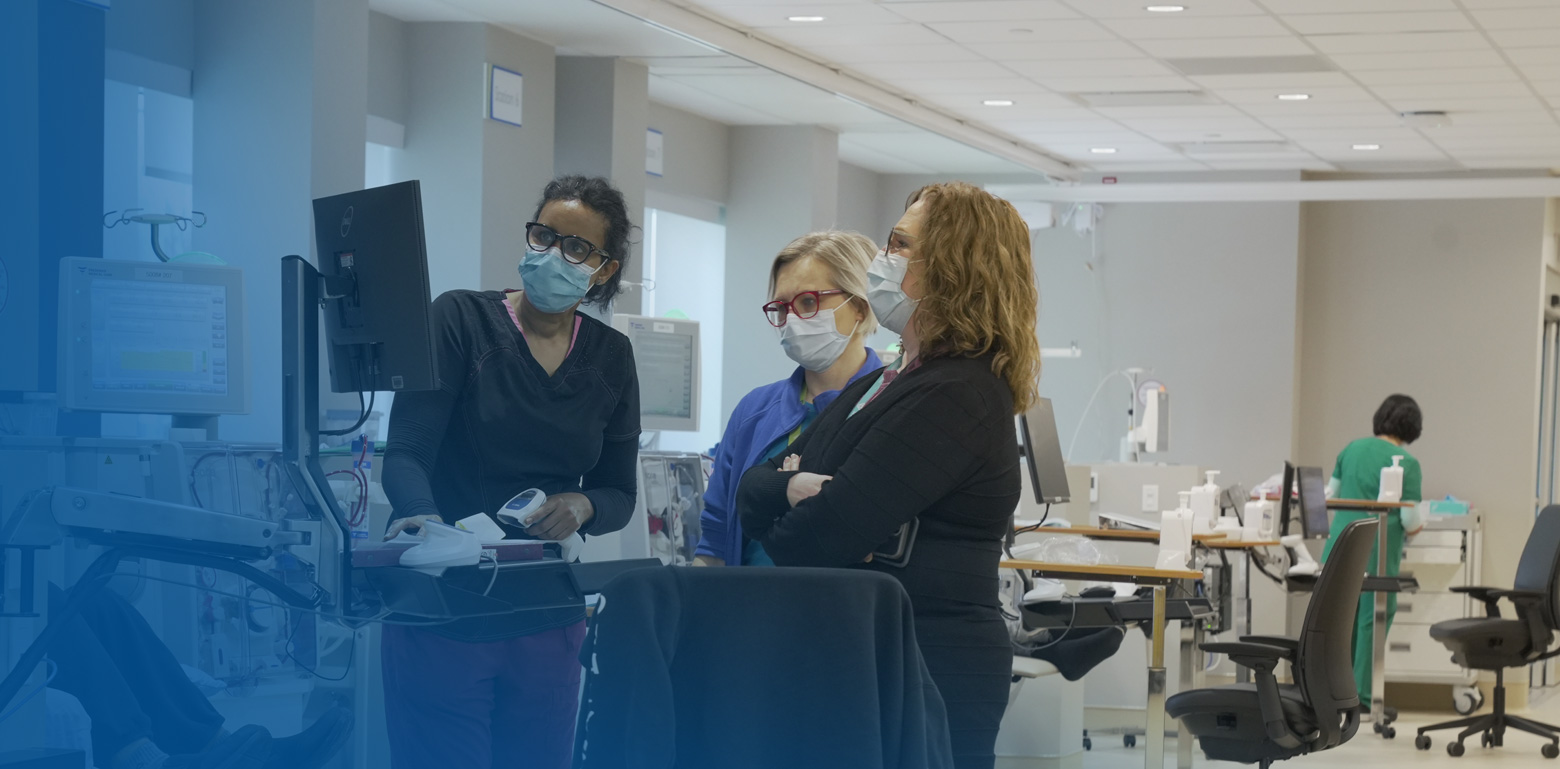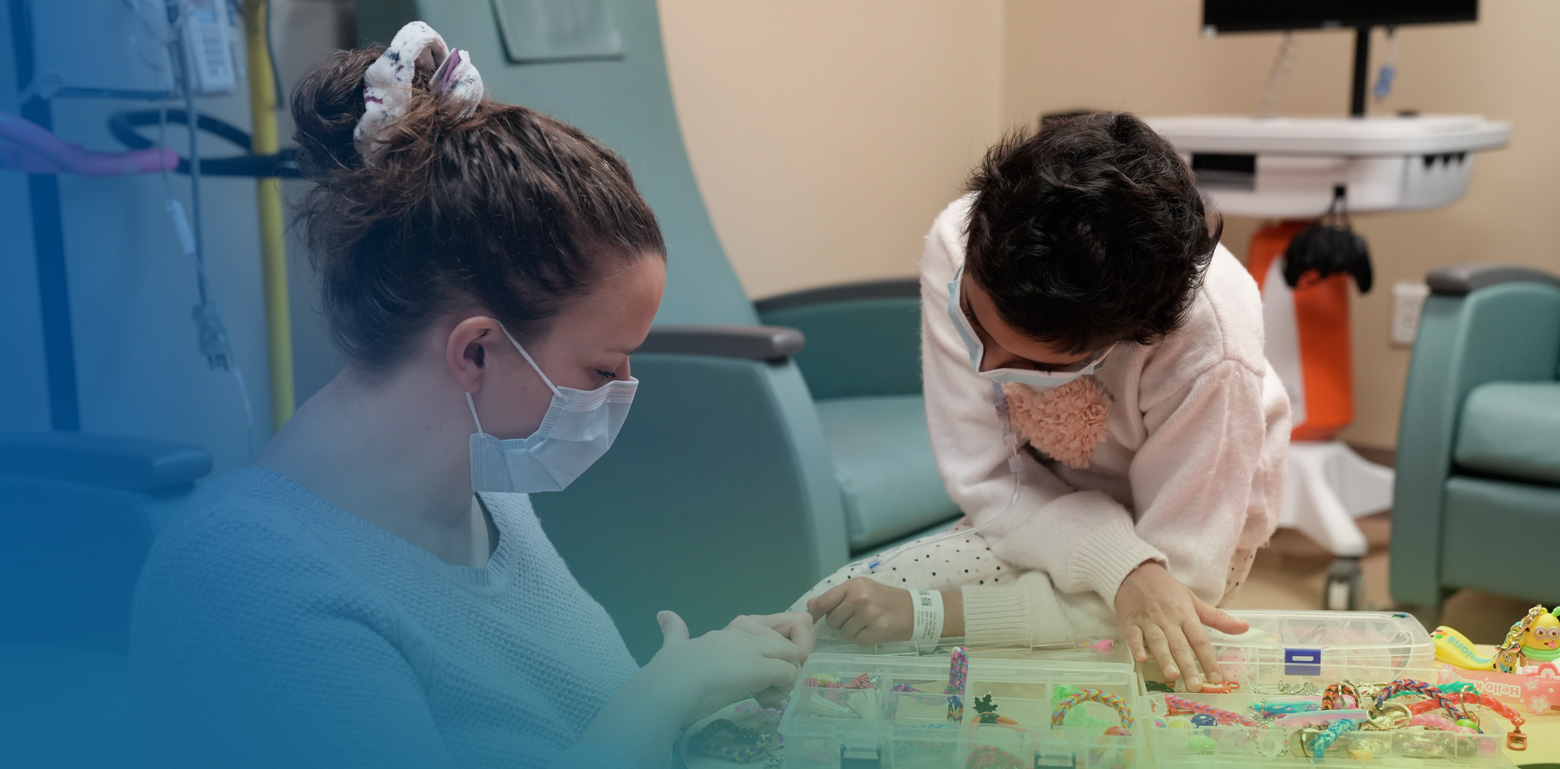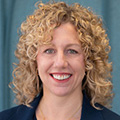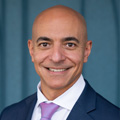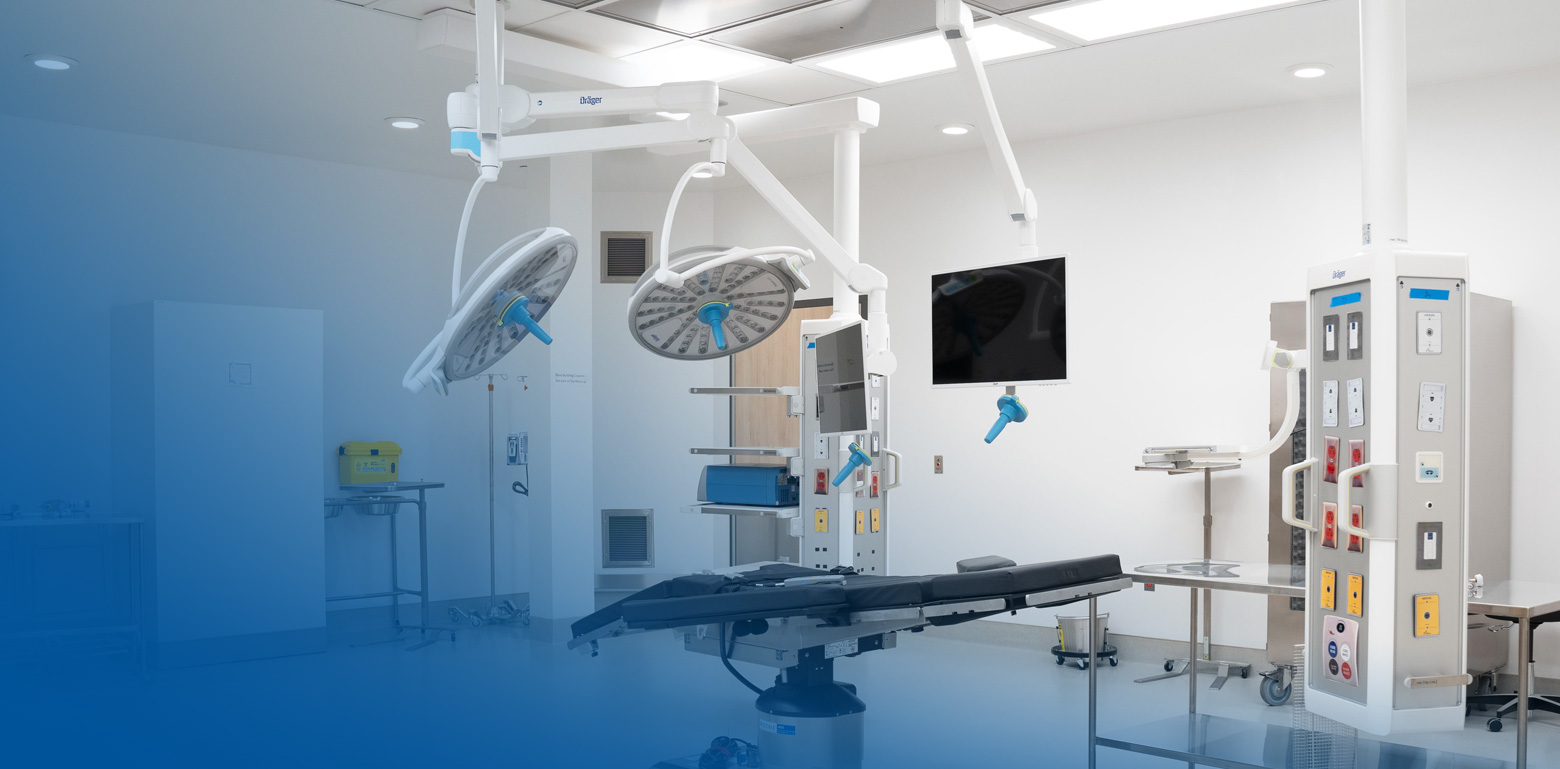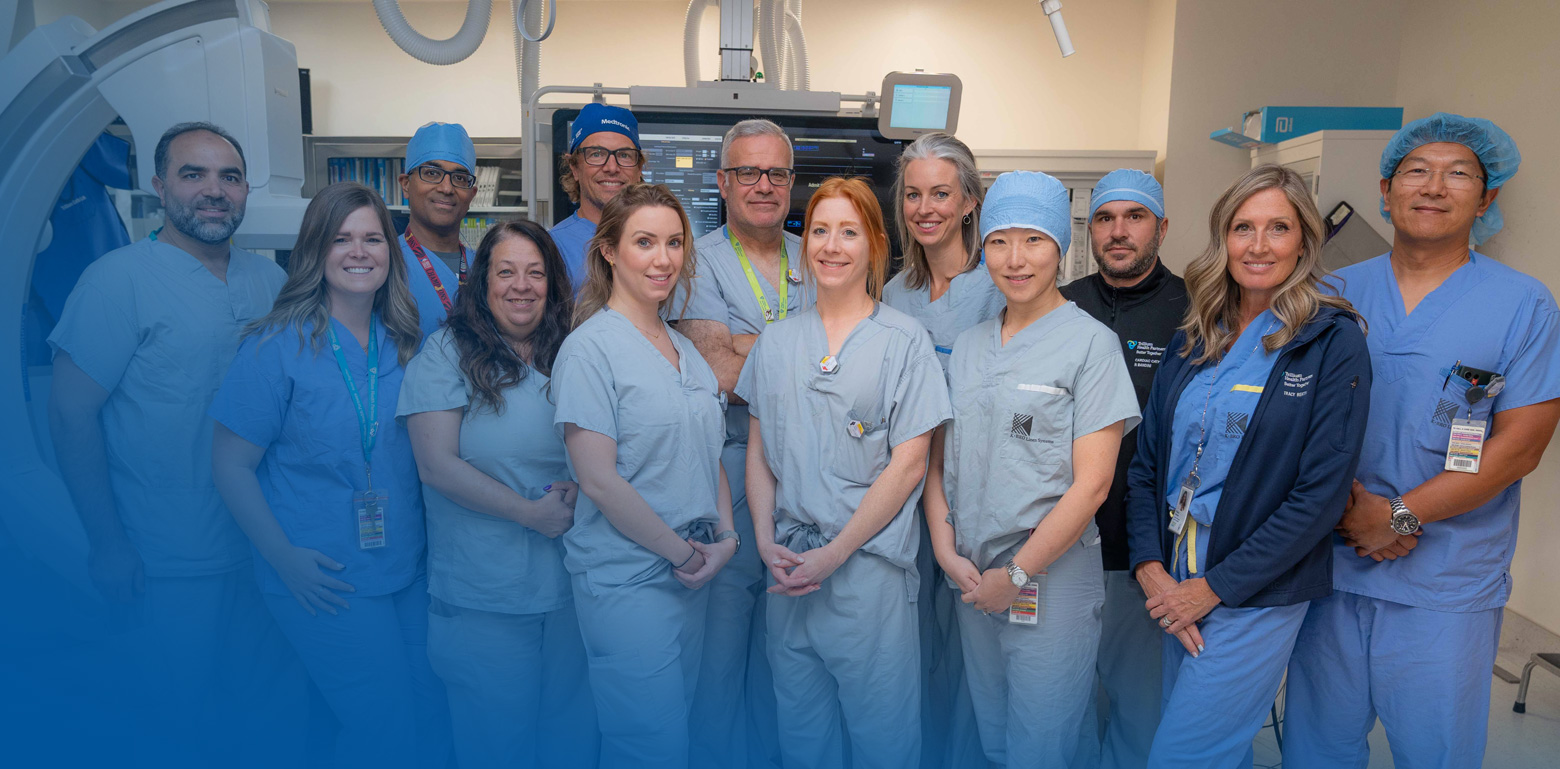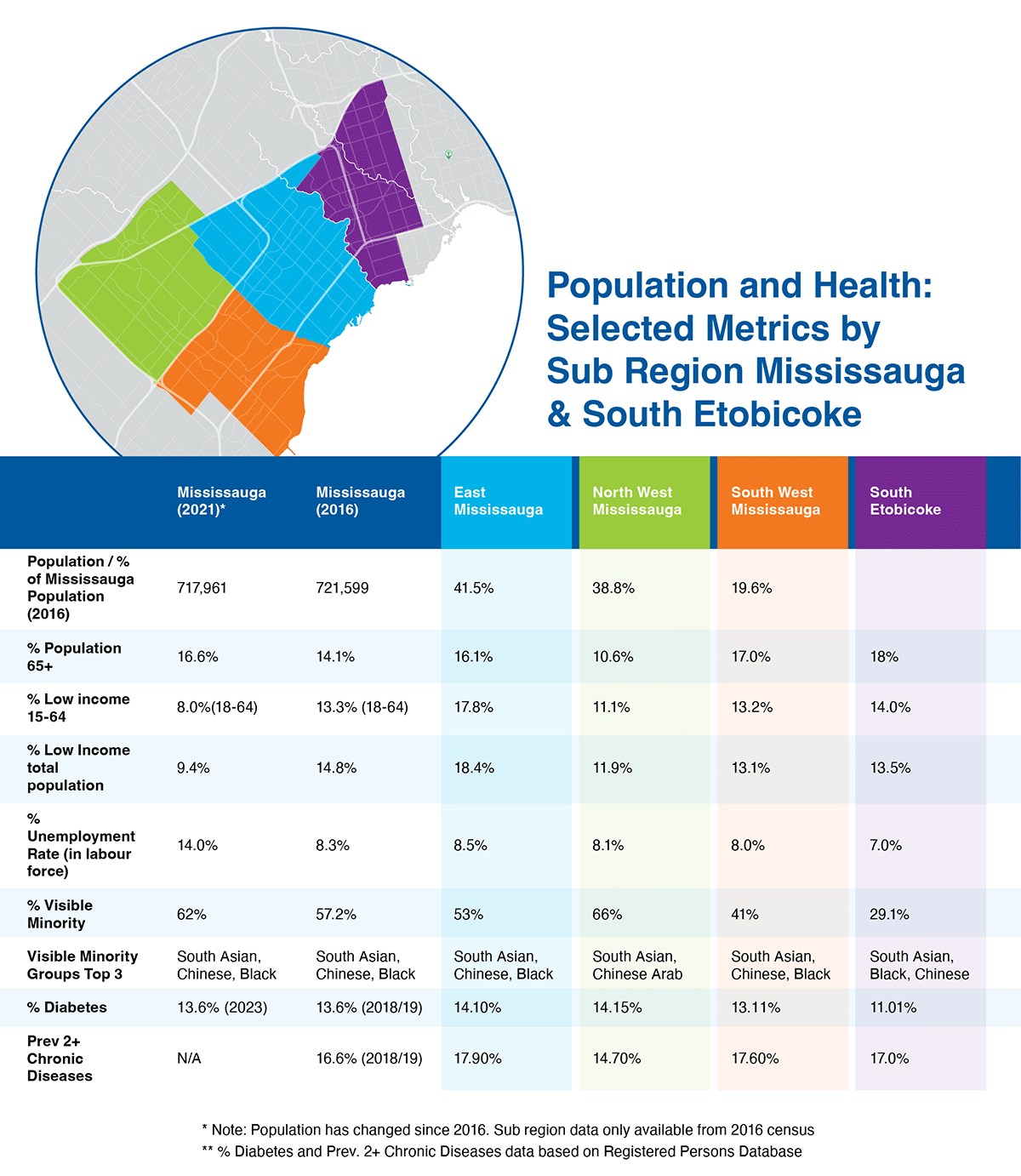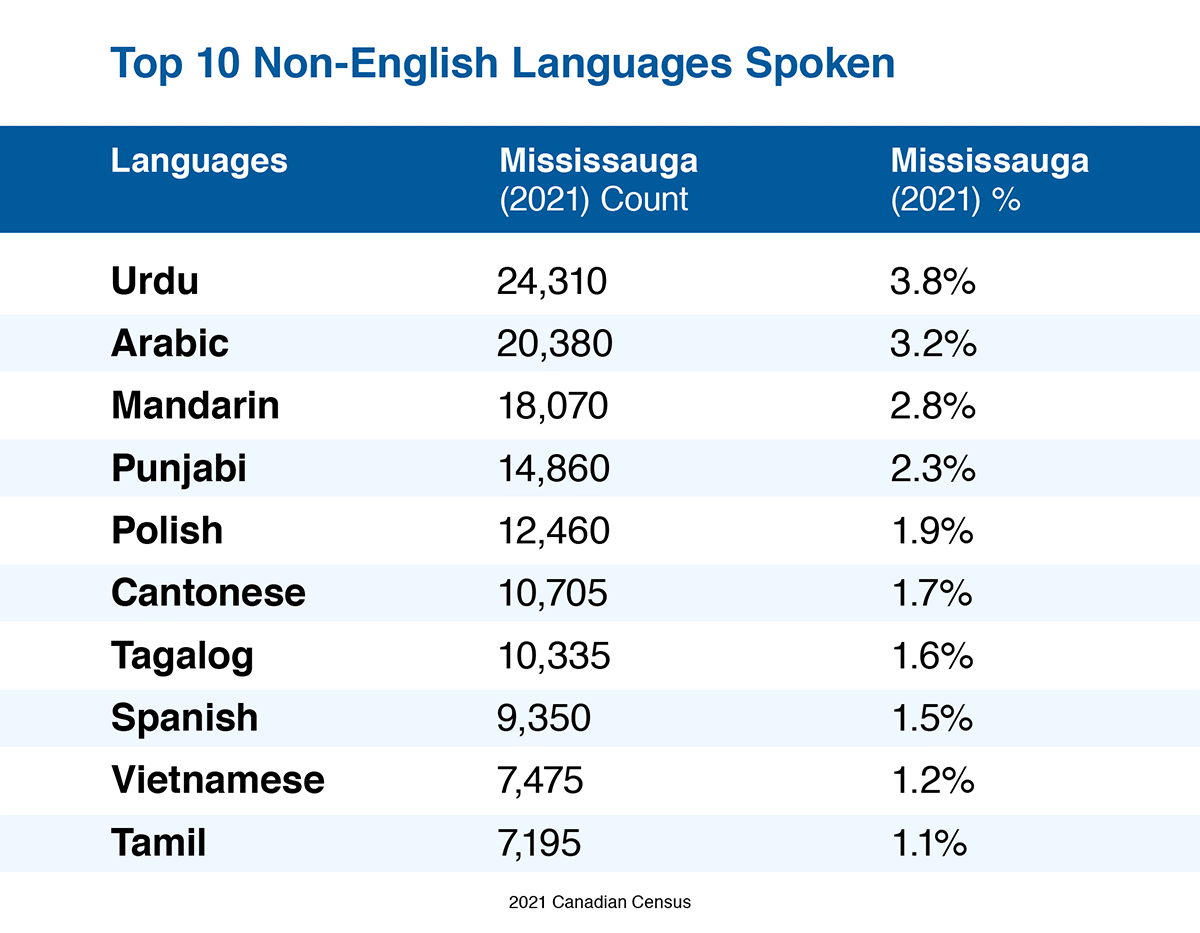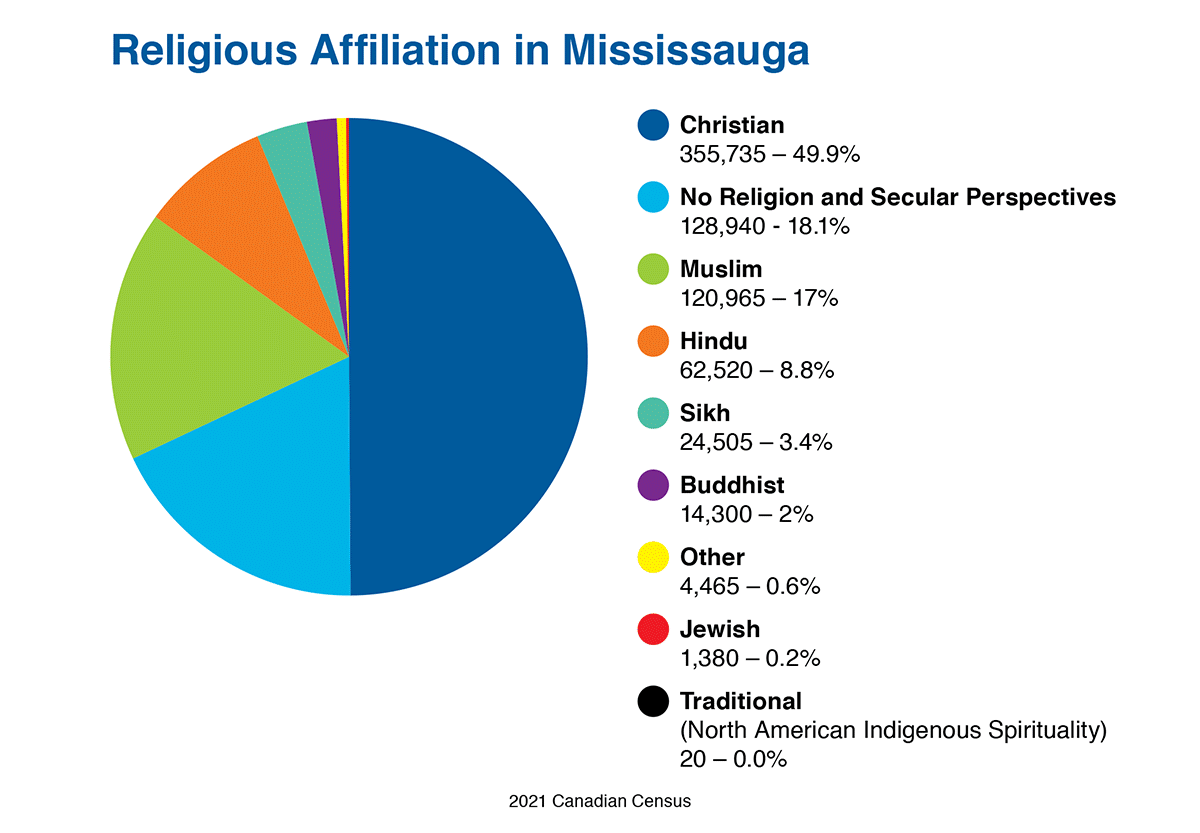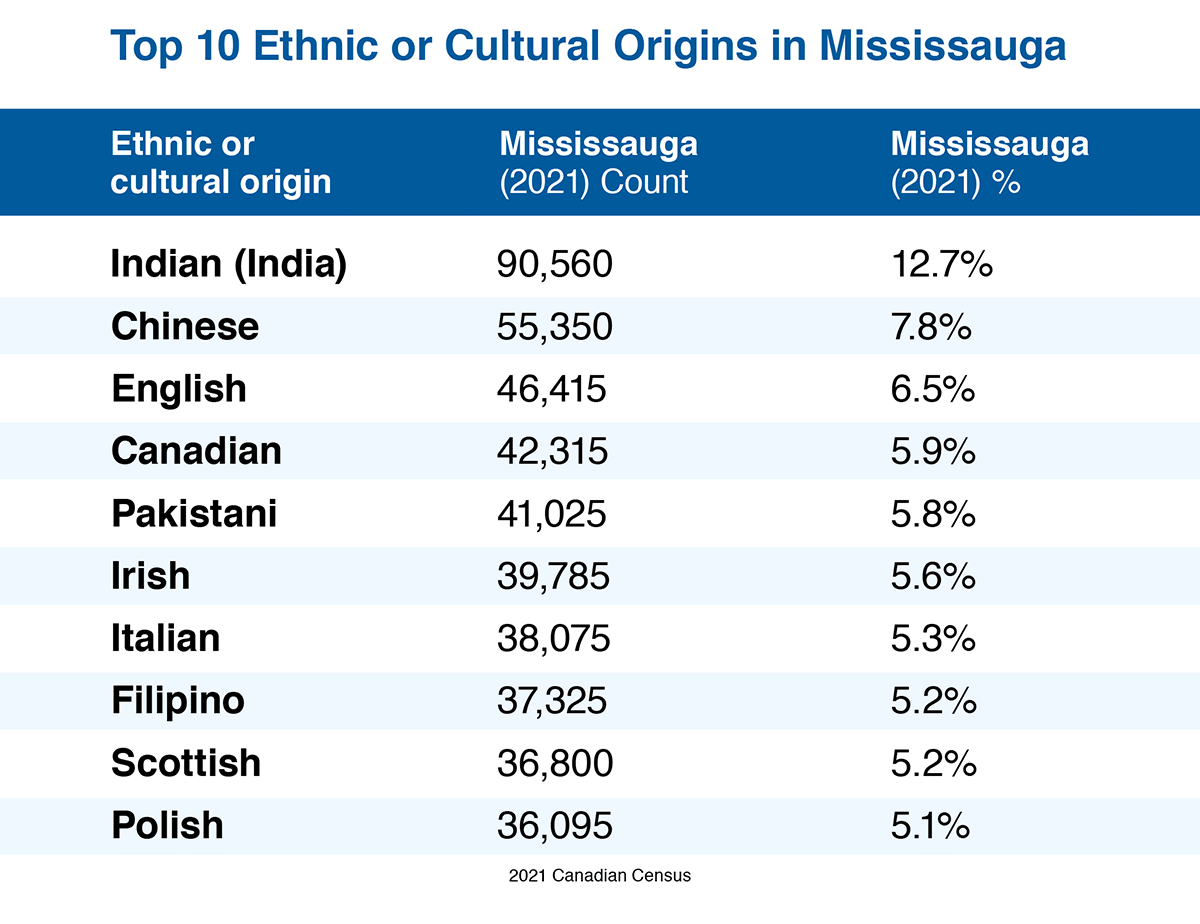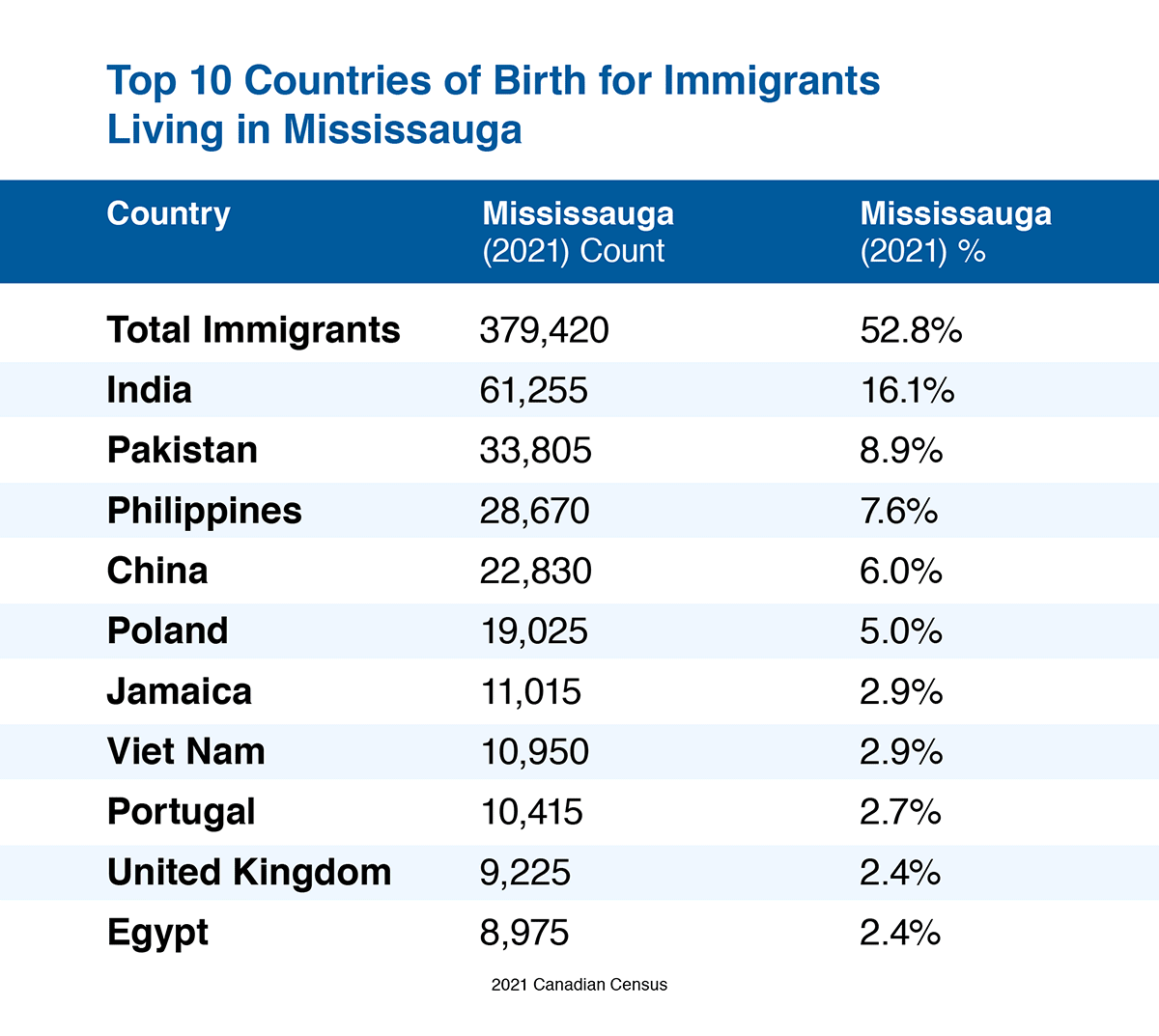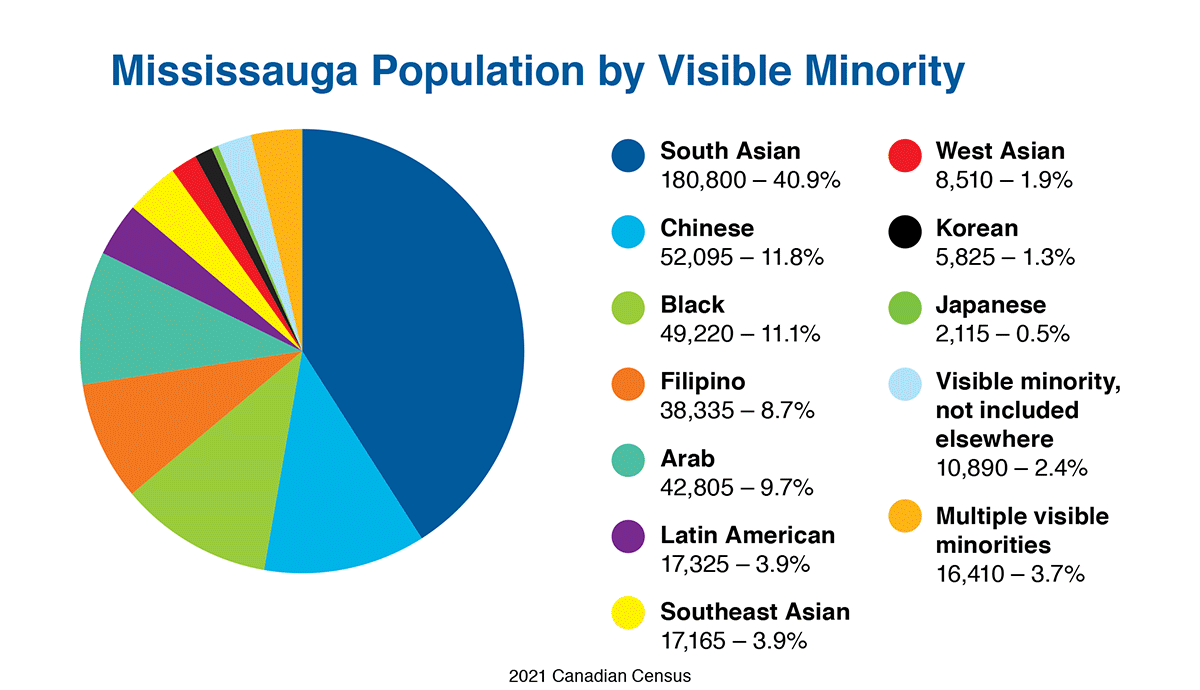A Message from our Board Chairs and CEOs
In 2024–25, Trillium Health Partners continued to make significant progress toward a new kind of health care for a healthier community. We provided care to a record number of patients, all while building new partnerships to deliver care for our growing community.
Last year, we began a new chapter in women’s and children’s health with a landmark donation from the Shah Family Foundation to establish Ontario’s first purpose-built hospital dedicated to their care. Named in recognition of this donation, the future Shah Family Hospital for Women and Children will provide specialized care for all people and families accessing reproductive, gynecological, paediatric, and postpartum care, in a safe, inclusive, and connected care environment. In preparation, work is underway to integrate all inpatient women’s and children’s services at the Credit Valley Hospital later this year.
Trillium Health Partners is using data and lived experience to bridge gaps in care and became one of the first hospitals in Canada to embed a health equity indicator into its organizational performance metrics – an important step in measuring and addressing disparities in care. This work is a part of connecting people to care that is upstream and focused on better health outcomes. This includes the expansion of THP@home – a program that helped over 1,000 people avoid lengthy hospital stays and saved an estimated $10 million last year alone.
We earned Stroke Distinction Accreditation from Accreditation Canada, recognizing the strength of our partnerships with paramedic services, emergency departments, and community organizations. We launched the AI for Better Health program to strengthen our health system and address real-world challenges. From AI-powered discharge planning to predictive models for diabetes prevention, these innovations are already helping us redesign care, reduce pressure on the hospital, and improve the experience for patients and our team.
We continue to be a leader in research, recognized for the third consecutive year as one of Canada’s Top 40 research hospitals. As one of the country’s largest academic teaching hospitals, we remain committed to fostering excellence in teaching, education, and mentorship to help prepare the next generation of health care providers. While continuing to create meaningful opportunities for growth and fostering a culture of well-being, safety, and collaboration for our people, we also undertook a large-scale transformation project – OneTHP: One People Experience – to modernize and streamline our people systems, support workforce planning, enable talent development, and improve scheduling and payroll standardization.
Canada’s largest health infrastructure renewal plan, Trillium HealthWorks, continues to advance as we prepare to break ground on The Peter Gilgan Mississauga Hospital and the Shah Family Hospital for Women and Children later this year. Construction is also progressing at the future home of The Gilgan Family Queensway Health Centre, which will become a dedicated hub for rehabilitation and complex care. Meanwhile, the Seniors Campus of Care at Wellbrook Place is set to transform how older adults access long-term care, hospice, primary care, and dialysis, creating a hub of care to support aging with dignity and independence.
All this momentum would not be possible without the extraordinary generosity of our community. Over the past year, more than 126,000 donors contributed $86 million in gifts and commitments, including a landmark contribution from Mona and Ash Singh to launch a first-of-its-kind wellness program for patients, families, and team members. Events like the Hazel McCallion Walk for Health and the Trillium Diwali Gala achieved record success, reflecting deep and growing support for the hospital. We are profoundly grateful for the exceptional generosity of our community, whose support plays a critical role in creating a new kind of health care for a healthier community.
We are also grateful to our team, whose dedication, compassion, and courage continue to shape the care we provide, and to our community partners for their shared commitment to better health. Together, we are creating something extraordinary: a constellation of care that is digitally connected, driven by partnerships and innovation, and powered by a talented and dedicated team.
With gratitude,


Joan Mohammed
Board Chair,
Trillium Health Partners
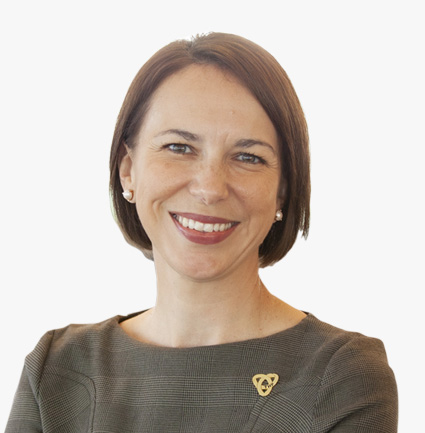

Karli Farrow
President and CEO,
Trillium Health Partners


Paul Sabourin
Board Chair,
Trillium Health Partners Foundation


Caroline Riseboro
President and CEO,
Trillium Health Partners Foundation

Trillium Health Partners is boldly reimagining what health care can be – care that is connected, proactive, and designed around the needs of the whole person. In 2024–25, we made meaningful progress toward building a system that puts people first, expands access, and supports the well-being of our team. Whether through digital innovation, integrated care, or purpose-built spaces, we are constructing the foundation for a more inclusive, responsive, and patient-centred future.
As we continue to shape the future of health care, Terri Irwin, Executive Vice President, Patient Care Services and Chief Nursing Executive, and Dr. Sam Sabbah, Chief of Staff, reflect on the past year and what lies ahead.
One of the things I’m most proud of this year is how we’ve made care more connected and accessible. A great example of this is THP@home, where we’ve helped over 1,000 patients safely transition from hospital to home or the community, with the right supports in place to continue healing. We also launched the Capacity Command Centre in partnership with Ontario Health and the Mississauga Ontario Health Team (Mississauga Health) to help reduce unnecessary admissions and improve patient flow during the respiratory surge season. It helped unlock the equivalent of two full inpatient units and was a huge step forward in how we manage patient volumes. These are just a few ways we’re building a more integrated system of care that truly supports the health of our community.
Enhancing patient experience is at the core of every initiative at Trillium Health Partners. We partnered with our team and patient and family advisors to reimagine hip fracture care, resulting in reduced time to surgery and shortened hospital stays to support faster, safer recovery. We also expanded access to advanced cardiac care, offering new hope to patients who were once considered inoperable. These are just two examples of how our team continues to innovate to deliver safe, timely, and effective care. It’s a privilege to work alongside such dedicated professionals who remain focused on what matters most: improving care for the community we serve.
We know that exceptional, person-centred care is only possible when it is developed and refined in deep collaboration with patients and providers. This year, we created new ways for our frontline teams and patients to shape how care is delivered. We piloted a learning program that gives team members a direct role in improving how we prepare patients to leave the hospital, making discharge instructions easier to understand and more patient focused. Patients and caregivers were engaged to help co-develop education materials for hip fracture care, including a video to improve comfort and understanding. Patient and provider engagement are central to how we are transforming care, today and into the future.
Feedback is essential to continuous improvement. We use data and analytics to identify opportunities, including insights from patient experience surveys, which feed into a real-time dashboard that leaders can review to enhance care. We also engage regularly with team members through senior leader rounding on units and at hospital-wide town halls. By keeping communication open and inclusive, we’re building a culture where insights lead to action and improvements are grounded in real experience, driving better outcomes for both patients and our team.
What excites me most is the opportunity to reimagine how care is delivered — not just where it happens, but how it feels for patients, families, and our team. More than 400 team members have already shared their insights to help design care spaces at the future homes of The Peter Gilgan Mississauga Hospital, the Shah Family Hospital for Women and Children, and The Gilgan Family Queensway Health Centre. Their voices are helping shape these spaces to be functional, inclusive, and truly centered around the needs of patients and providers. It’s inspiring to be part of that kind of transformation.
This is a once-in-a-generation opportunity to reimagine care from the ground up — not just by designing new spaces, but by embedding healing, respect, and collaboration into every interaction. I’m most excited about the opportunity to bring clinical insight, advanced technology, and equity together to shape a system of care that works better for everyone. As we move from planning to reality, I’m looking forward to building something exceptional with our team and community.
While the health care landscape continues to evolve, we’re taking meaningful steps to support our teams and the people we care for. Over the past year, we welcomed 149 new nurses through the provincial Nursing Graduate Guarantee program and 28 internationally educated nurses, each supported with the tools they need to succeed and feel part of our team from day one. We’re also building on that support through programs like Clinical Scholars and Investing in Our People, which create space for learning, connection, and growth at every career stage.
We’re rethinking wellness from the ground up, placing greater focus on mental health, mentorship, and professional development. This commitment to wellness came to life last year through a transformational gift from Mona and Ash Singh, which will include dedicated wellness spaces for staff, patients, and families within The Peter Gilgan Mississauga Hospital when it is built.
Building a culture rooted in inclusion and respect is essential to how we support our people and deliver care. Through intentional listening, learning, and action we’re creating a workplace where everyone feels safe, valued, and empowered to reach their full potential. This includes investing in wellness, leader development, academic growth, and strong partnerships across the health system.
One example of this commitment in action is Trillium Health Partners' collaboration with Peel Regional Paramedic Services through the Community Paramedicine Program, which supports frail, medically complex patients as they transition from hospital to home. Trillium Health Partners' Solutions Clinic provides real-time virtual consults and physician backup to support complex care needs in the home, helping paramedics manage conditions like acute exacerbation of heart failure and chronic obstructive lung disease as well as obtain point of care tests when required. To date, the partnership has enabled more than 380 virtual assessments and achieved a six per cent year-over-year increase, helping prevent unnecessary emergency visits and bringing hospital-level care into the community.
From expanding care in the community to advancing integrated models with government and health system partners, we’re responding to the record demand for care with innovative, people-centred solutions. Our team is our strength, and supporting it is the foundation of exceptional care.
Deliver the highest quality care
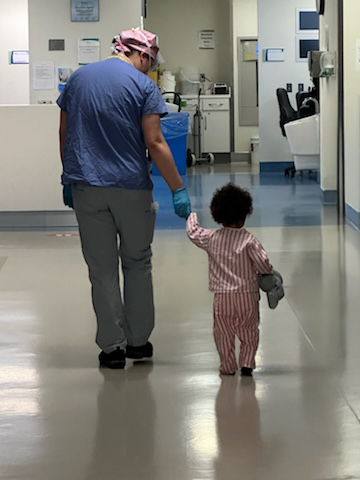
Building for Generations — The Future Shah Family Hospital for Women and Children
Last year, Trillium Health Partners received a landmark donation from the Shah Family Foundation, paving the way for Ontario’s first purpose-built hospital dedicated to women’s and children’s care — named the Shah Family Hospital for Women and Children in recognition of the donation. A first of its kind in Ontario, the Shah Family Hospital for Women and Children will provide specialized care for all people and families accessing reproductive, gynecological, paediatric, and postpartum care, in a safe, inclusive, and connected care environment.
The new facility will feature specialized birthing suites, an expanded Neonatal Intensive Care Unit with couplet care, paediatric mental health beds — a first for the region — and a dedicated emergency zone for children and families. In preparation, all inpatient women’s and children’s services will be integrated at the Credit Valley Hospital later this year, improving coordination and laying the foundation for a seamless transition.
Beyond hospital walls, the Women’s and Children’s Program is extending care into the community. Launched in 2024, the Perinatal Community Care Program is a midwife-led initiative designed to fill critical gaps in postpartum care, especially for families without access to a primary care provider. Through outpatient clinics, virtual visits, and community-based care, midwives offer continuity, medical and emotional support, and vital connections to local services. This work, grounded in meeting people where they are, will be further amplified within the future Shah Family Hospital for Women and Children, ensuring those who need care most continue to receive timely, inclusive, and culturally responsive support.
“Being a midwife is an incredible privilege,” says Emily Viets, Program Coordinator and registered midwife. “I love supporting families during such an important time in their lives, while ensuring they have access to comprehensive perinatal care close to home.”
Together, these efforts reflect Trillium Health Partners’ bold vision for a new kind of health care — one that supports healthier starts, stronger families, and a healthier future for generations to come.
A New Path to Healing: How Trillium Health Partners Is Transforming Hip Fracture Care
At 73, Ann Beneteau never expected a sudden fall to change her life. When she fractured her hip last June, she was rushed to Trillium Health Partners. From the moment she arrived in the emergency department to the day she returned home, Ann experienced compassionate, coordinated care from a team that made her feel seen, supported, and safe. She received timely surgery, and her transition home was seamless, thanks to Trillium Health Partners’ partnership with CANES Community Care.
For many older adults, a hip fracture can mean a long and difficult recovery, impacting mobility, independence, and overall well-being. Last year, Trillium Health Partners brought together more than 150 staff, physicians, and patient partners to reimagine hip fracture care.
Patients now receive surgery sooner, experience better pain management, and recover faster through wraparound care that begins from the start. A mobile nerve block service at the Credit Valley Hospital delivers effective, opioid-sparing pain relief, helping reduce the risk of delirium. A real-time patient tracker and performance dashboard also enable the team to deliver the right care at the right time.
The impact has been remarkable. Time to surgery has been cut in half, with 92 per cent of patients now receiving surgery within 48 hours of arriving to the hospital or emergency department. Average hospital stays have decreased by two days, helping patients progress to the next phase of recovery sooner. These efficiencies also benefit the community by unlocking the ability to admit 100 additional patients from the emergency department to inpatient care faster without requiring additional resources.
This vital work was supported by a generous $5.6 million raised through the Tour de Bleu fundraiser. By focusing on the whole person, not just the injury, Trillium Health Partners is setting a new standard for hip fracture recovery.

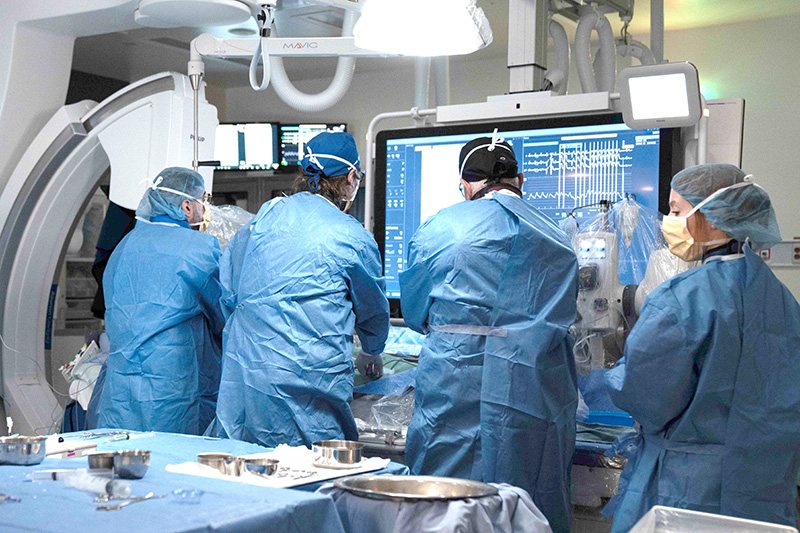
Bringing Specialized Care Closer to Home
At Trillium Health Partners, delivering exceptional care means more than responding to illness — it means anticipating needs and continuously innovating to bring the right care closer to home. Over the past year, this commitment has led to new programs, advanced procedures, and greater access to specialized services that improve outcomes while reducing wait times and travel for patients and families.
Last year, we launched the Impella program, a minimally invasive, tiny heart pump that helps cardiologists perform complex, high-risk procedures more safely, offering a chance at recovery to patients who were once considered inoperable. “Our focus is on improving quality of life,” says Dr. Rahul Bhindi, interventional cardiologist at Trillium Health Partners. “We work across teams to design personalized care plans that reflect each patient’s goals.”
Since the program’s launch, some patients have been able to return home as early as the next day, supported by coordinated follow-up from their cardiologist, family physician, and Trillium Health Partners’ coronary care team.
The hospital also introduced left atrial appendage occlusion, a procedure that lowers stroke risk for patients with irregular heartbeats who are unable to take blood thinners. In addition, the hospital’s robotic surgery program has expanded to include robot-assisted partial nephrectomy, a highly precise technique for removing kidney tumors. This approach allows surgeons to preserve more healthy kidney tissue, reduce complications, and support faster recovery for patients.
Specialized care has also advanced in endoscopy and paediatrics. Trillium Health Partners now offers advanced endoscopy procedures that improve diagnosis and treatment while reducing the need for invasive surgery. Meanwhile, the new Paediatric Nephrology Clinic is helping meet growing demand for kidney care services and shorten wait times for young patients and their families.
Together, these efforts represent meaningful progress in reimagining care to better serve patients at every stage and in every setting. Grounded in collaboration and a shared commitment to excellence, these innovations are helping bring high-impact, specialized care closer to the people who need it — where and when it matters most.
Partner to achieve better health for all
THP@home: Local Partnership Expands Access to High-Quality In-Home Care
When 82-year-old Mike Bradford reflects on the past few months, one word comes to mind: grateful. His wife, Grazina, had lived with osteoarthritis for years, but after a fall that required surgery, her mobility steadily declined. Then she began experiencing excruciating back pain and was rushed to the emergency department at Trillium Health Partners. Alongside her existing condition, she was diagnosed with a compacted back fracture and admitted for nearly a month to manage severe pain.
The THP@home program, in partnership with Spectrum Health Care, stepped in to ensure a seamless transition home, with the right supports in place: an adjustable hospital bed, therapy services, and personal support workers to assist with daily care.
For Mike, the help was life-changing. “When something like this happens, you don’t know what to do next,” he shared. “THP@home and Spectrum reached out proactively and put everything in place for us. They’ve been incredible.”
Grazina is slowly regaining her mobility using her walker and is working toward independence. The ability to heal at home, with access to their family physician, has made all the difference.
Launched in late 2022, THP@home has supported more than 1,000 patients in the past year alone. Reflecting Trillium Health Partners’ commitment to integrated, community-based care, the program enables the hospital to think creatively and remove common barriers to discharge—such as providing essential equipment or arranging a home cleaning— so care can be delivered safely.
“By removing the obstacles that delay discharge and supporting patients with what they actually need, we’re helping people heal in the place that’s best for them,” says Stephanie Joyce, Senior Vice President, Patient Care Services and Health System Integration at Trillium Health Partners.
THP@home by the Numbers
saved for the hospital
freeing up the equivalent of 35 hospital beds
saved
Highest weekly volume to date:
41 patients transitioned,including 14 from the emergency department
through a new emergency department process avoiding admission or enabling safe discharge
At the heart of THP@home is a commitment to whole-person care, supporting recovery and overall well-being. Each patient is guided by a Care Navigator, who helps coordinate home care, connections to community services like meal delivery, and communication with primary care. By working across sectors to deliver the right care in the right place, Trillium Health Partners and its community partners are improving health outcomes while building a more integrated, sustainable system of care.
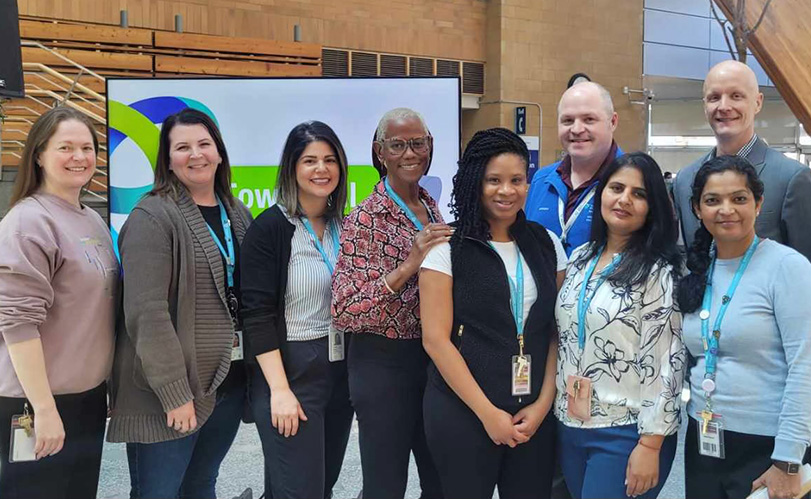
Shape a healthier tomorrow
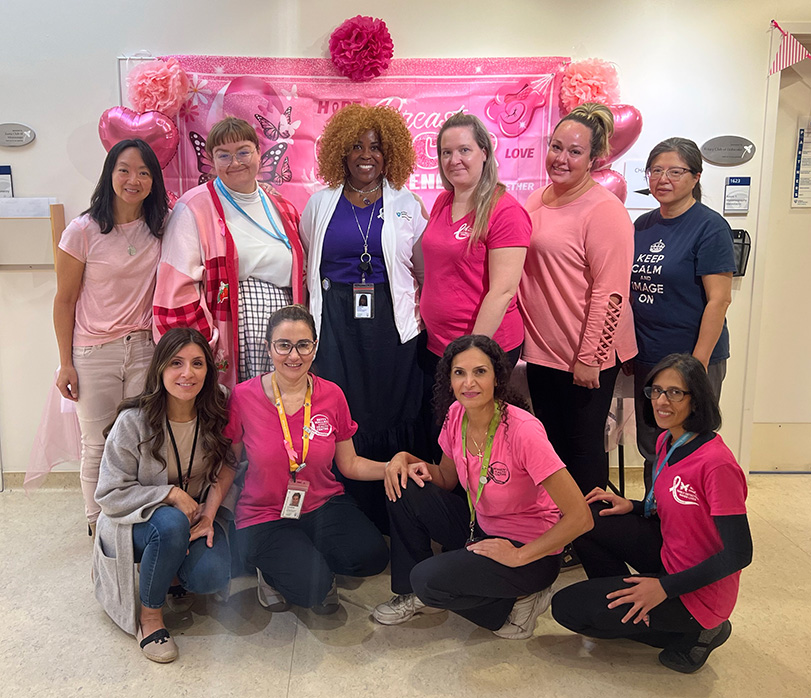
Breaking Barriers to Early Detection: Expanding Access to Life-Saving Cancer Screenings
Cancer screening saves lives — but only if people can access it. As part of our strategy to truly understand our community, Trillium Health Partners’ investment in health data analytics is preventing illness, improving access to care and reaching underserved and equity-deserving groups.
Using neighbourhood-level data to identify access gaps and at-risk populations, Trillium Health Partners found that, in fiscal year 2024–25, patients at the hospital from the poorest neighbourhoods were 4.3 times less likely to receive breast cancer screening than those from wealthier areas. Breast screening rates in Mississauga and west Toronto remain among the lowest in Ontario.
In a grassroots initiative led by Trillium Health Partners and the Mississauga Health, in partnership with Ontario Diagnostic Centres and Indus Community Services, a one-time screening blitz has become a monthly program focused on reaching underserved and equity-deserving groups. These clinics are open to anyone eligible for the Ontario Breast Screening Program, including women, Two-Spirit people, trans people, and non-binary individuals aged 40 to 74.
Culturally responsive outreach has played a critical role in building trust, including a CHIN Radio interview with Dr. Baldeep Chera, a community family physician and Primary Care Screening Lead for the Mississauga Halton Central West Regional Cancer Program. As Dr. Chera notes, “Screening is one of our most powerful tools for reducing cancer deaths — but only if people can access it.”
The community response has been powerful. Initially expected to serve 30 participants per clinic, demand quickly grew to over 125 screenings per month, more than four times the original projection. “It’s really a great experience and awareness for breast cancer screening,” said one participant. Another shared, “It was good, especially since it was my first time.”
In addition to community-based clinics, Trillium Health Partners also hosted pop-up screening events at all three hospital sites last October, screening 217 people — including 100 first-time participants.
In 2024, Trillium Health Partners also became the first hospital in Canada to integrate the Relative Index of Inequality into regular performance reporting, helping care teams identify gaps and better reach those most in need.
Looking ahead, future efforts will focus on deepening the understanding of the sociodemographic factors that contribute to low screening rates, such as lack of access to a primary care provider, and on co-designing targeted interventions with the community.
Together with its partners, Trillium Health Partners is not just delivering services — it is transforming how health care is planned, delivered, and experienced. That’s what shaping a healthier tomorrow looks like.
Educating for Impact: Shaping the Future of Care
At Trillium Health Partners, education is fundamental to shaping a healthier community. Thousands of learners come to Trillium Health Partners every year to learn from clinician leaders across medicine, nursing, and other health professions. As a teaching hospital, Trillium Health Partners is developing the next generation of providers while advancing care for patients today.
Last year, more than 3,000 learners received training at the hospital, supported by new postgraduate education pathways, enhanced simulation training, and initiatives focused on equity, wellness, and interprofessional collaboration. This year also marks the first time residents will be matched in Trillium Health Partners’ new core Emergency Medicine and Internal Medicine Chief Medical Resident programs.
A key part of this hands-on learning approach is the hospital’s Simulation Program, which prepares team members to deliver safe, high-quality care in a rapidly evolving environment. The program has continued to grow as a pillar of experiential learning and quality improvement. With over 2,800 participants in simulation-based sessions, ranging from emergency preparedness to skills development, teams have practiced, refined, and enhanced care in safe, team-based environments. These experiences foster communication, collaboration, and confidence across disciplines.
Education at Trillium Health Partners also means embedding quality and innovation into learning. By supporting the Mississauga Academy of Medicine's Quality Improvement Experiential Student Training (QuEST) program, Trillium Health Partners is helping students lead real-world projects that improve care delivery and shape system transformation. As featured by the Ontario Hospital Association, QuEST is redefining how learners contribute to meaningful change.
With strong academic partnerships, a focus on inclusive learning, and a deep commitment to system improvement, Trillium Health Partners is proud to be a teaching hospital that shapes future clinicians and a new kind of health care system that reflects the needs of the community.
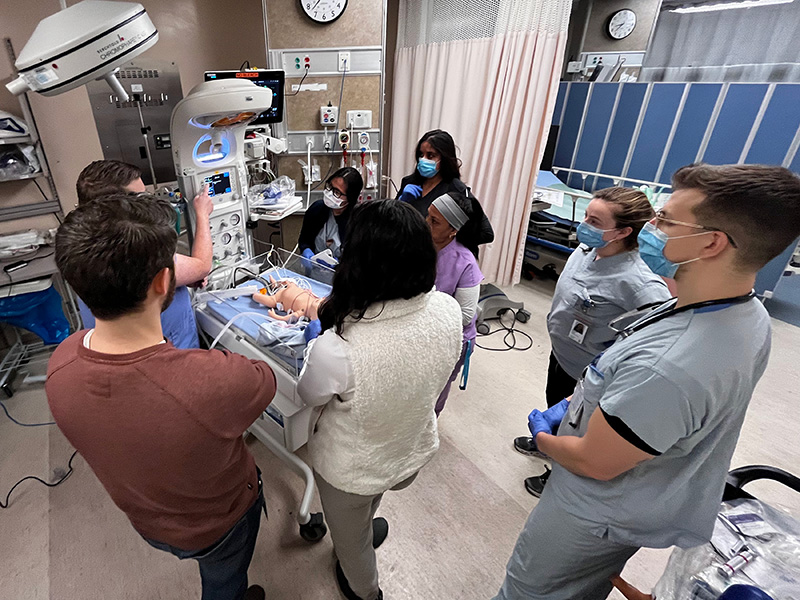
Inspire and invest in a diverse Team THP
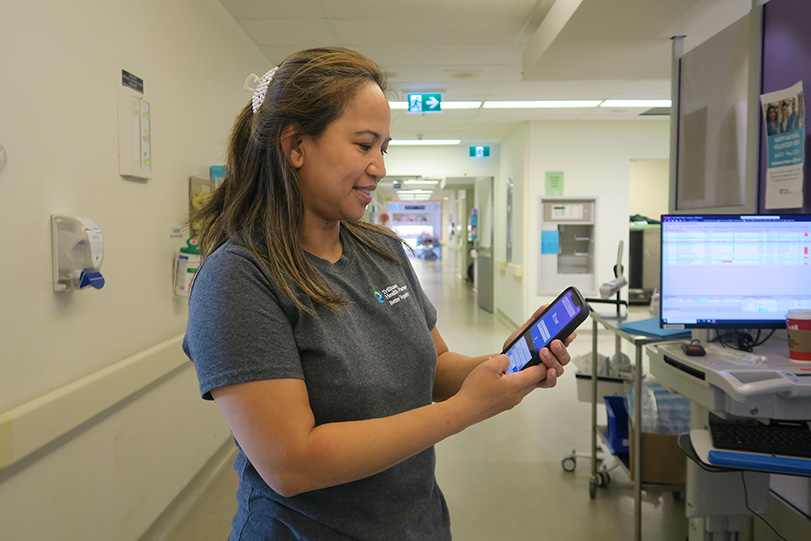
WeMentor+: How One Nurse Is Shaping the Future of Mentorship at Trillium Health Partners
When Domino Puson first began working as a Unit Coordinating Assistant in the emergency department, he quickly realized the role wasn’t just about clerical skills — it was about confidence, communication, and community. That insight deepened when he became a nurse, and he often found himself wishing for more support and access to mentorship.
“There were definitely days I wished I had someone to talk to who’d been there,” he recalls. “Someone who could say, ‘Here’s what helped me, and here’s how you can find your way, too.’”
Now, Domino is helping to build that support system for others. As a project coordinator for the WeMentor+ app — a digital platform that connects nurses with mentorship, resources, and real-time support — he is helping shape a culture of growth, inclusion, and belonging at Trillium Health Partners.
“I know how powerful mentorship can be,” Domino says. “And how hard it is to find the right person at the right time. That’s why this work means so much to me.”
Launched in November 2024 through Trillium Health Partners’ Nurse Innovator Award Project, WeMentor+ was developed in partnership with nurses and clinicians to support career development and well-being. Powered by MentorCity and funded by the Registered Nurses Foundation of Ontario and the CANHealth Network, the app offers tap-to-connect matches, personalized profiles, resource libraries, goal tracking, and more — all designed to make mentorship accessible and meaningful. Equity, diversity, and inclusion are central to the experience, creating a safe space for connection across all stages of a nursing career.
Since the pilot, more than 90 nurses have joined the platform, with 59 experienced mentors stepping up to guide the next generation. Early feedback has been overwhelmingly positive, with users praising the app’s intuitive design and its ability to build community.
“One of my favourite stories was from a nurse who told me, ‘I’ve been here 32 years, and this is the first time I’ve had formal mentorship.’ That stayed with me,” Domino shares. For him, WeMentor+ is about more than technology — it’s about cultivating a workplace where every team member feels supported and empowered. “I envision Trillium Health Partners as a garden — each person unique, growing in their own way. All we need is a gardener to nurture and help them flourish. That’s what mentorship is.”
Trillium HealthWorks
Reimagining Health Care from the Ground Up
As the largest health care infrastructure renewal initiative in Canadian history, Trillium HealthWorks is more than a building project - it’s a bold reimagining of care, grounded in partnership and purpose. Together, we’re creating a digitally connected, human-centred constellation of care that puts people first.
The future homes of The Peter Gilgan Mississauga Hospital, the Shah Family Hospital for Women and Children, and The Gilgan Family Queensway Health Centre are being shaped by those who know care best: health professionals, patients, and community partners. With more than 1,200 beds, expanded services, and cutting-edge technology, this transformation will shorten wait times, improve access, and bring specialized care closer to home.
Clinical planner Cathy Walker shares how even small design choices make a big difference.



“A wall in our mental health room can be written on, offering patients a form of self-expression,” she says. “We’re also introducing padded privacy partitions that double as yoga mats when removed from the door frames. These partitions can also hold stickers - letting patients personalize their space in ways that are creative, calming, and dignified.”
These innovations, developed with input from regional hospitals and Trillium Health Partners’ Patient and Family Partners Network, are reshaping what healing environments can and should be.
And we’re just getting started. Later this year, a new state-of-the-art MRI machine will be introduced at the future home of The Gilgan Family Queensway Health Centre, improving diagnostic speed, reducing wait times, and elevating patient comfort.
This is more than infrastructure. It’s a movement - to rebuild health care from the inside out, shaped by those we serve, and built for the future we all deserve.
Sustainability
Building a Healthier, Greener Future for Our Community
At Trillium Health Partners, we are committed to delivering high-quality health care while taking strategic steps to lower energy use, cut greenhouse gas emissions, and enhance financial sustainability — allowing us to reinvest savings directly into patient care.
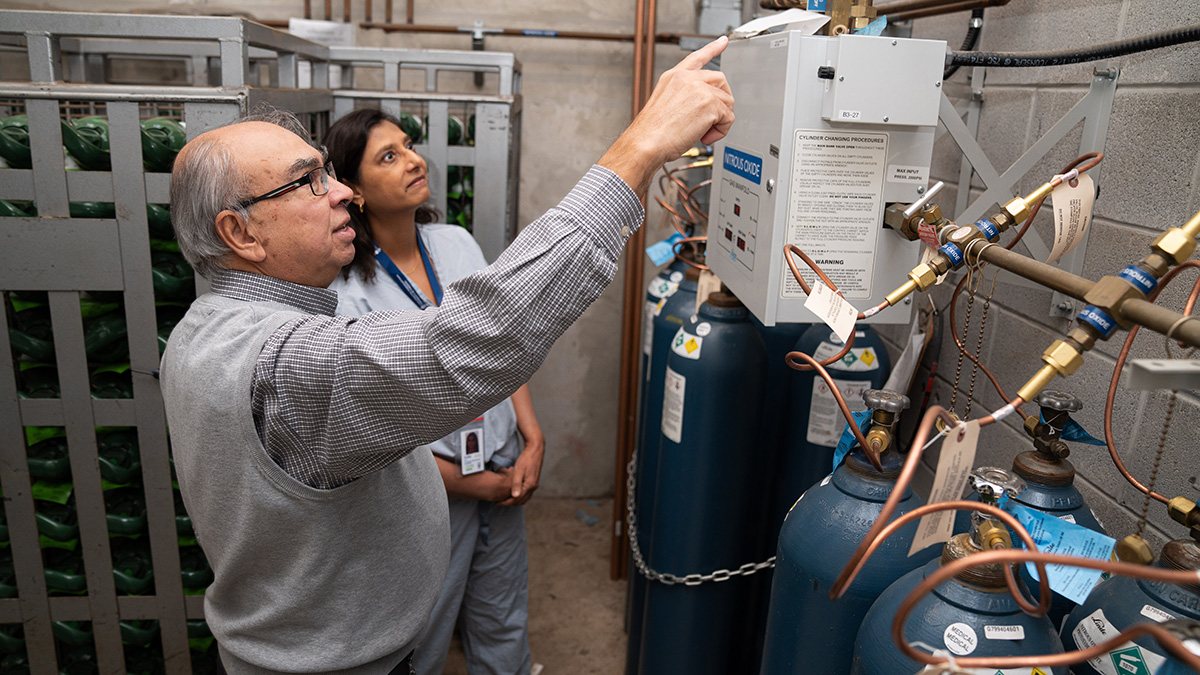
Our Energy-Saving Achievements:
Through conservation initiatives, we have already made significant progress:
equivalent to taking 2,200+ cars off the road for a year.
helping reduce costs and reinvest savings into patient care
comparable to planting 350,000 trees.
By 2029, we target:
enough to power ~879 homes annually
equivalent to heating ~121 homes per year.
similar to removing ~686 cars from the road each year.
*Equivalents calculated based on Trillium Health Partners’ 2024 electricity and natural gas usage using industry-standard conversion factors.
Leading the Way in Sustainable Health Care: Trillium Health Partners Eliminates Central Nitrous Oxide Systems
Trillium Health Partners is committed to delivering high-quality care while reducing its environmental impact. As part of this commitment, the hospital began removing all centralized nitrous oxide distribution systems across its three sites, completing the project in March 2025. This change is expected to cut greenhouse gas emissions by 1,250 tonnes of carbon dioxide annually - the equivalent of taking more than 290 gasoline-powered cars off the road while also saving at least $90,000 per year.
Nitrous oxide is an anaesthetic gas used in health care settings to relieve pain, mostly during childbirth and surgery. It is also a potent greenhouse gas that is about 300 times more effective at trapping heat in the atmosphere than carbon dioxide. Studies have shown that in traditional hospital settings, centralized nitrous oxide systems can lose up to 99 per cent of the gas through leaks before it reaches patients. By switching to portable delivery systems, nitrous oxide is delivered much more efficiently, sustainably, and at a much lower cost, without impact to patient care.
Trillium Health Partners is one of the first hospitals in Canada to take this step. Looking ahead, The Peter Gilgan Mississauga Hospital will be built without a central nitrous oxide distribution system, making it one of the first hospitals in Ontario to adopt this forward-thinking approach.
Trillium Health Partners’ commitment to eliminating unnecessary emissions reflects a broader focus on environmental responsibility in health care. “Our anesthesia department has been eager to implement solutions that reduce our impact on the environment,” says Dr. Anita Rao, Physician Lead, Environmental Sustainability. “By taking this step, Trillium Health Partners is not only advancing best practices but also serving as a model for hospitals across Canada.”
Through initiatives like this, Trillium Health Partners continues to integrate sustainability into hospital operations, ensuring that future health care is both environmentally and financially sustainable.
Trillium Health Partners’ 2024 Sustainability Scorecard: Progress & Opportunities
Trillium Health Partners continues to demonstrate leadership in sustainable health care, as reflected in the 2024 Toronto Academic Health Sciences Network (TAHSN) Sustainability Balanced Scorecard. The results highlight Trillium Health Partners’ strong governance, commitment to emissions reduction, and focus on building a more resilient health system.
Key Findings:
- Leadership & Governance: Trillium Health Partners is seen as a leader in sustainability, with strong support from senior leaders and dedicated resources helping drive environmental efforts across the organization.
- Emissions & Waste Reduction: The hospital is making steady progress in cutting down greenhouse gas emissions and reducing waste, which supports its goal of creating a healthier future.
- Sustainable Procurement & Climate Resilience: Trillium Health Partners is choosing more environmentally friendly options for goods and services and is also working on plans to prepare for the impacts of climate change.
- Opportunities for Growth: There is still room to grow when it comes to making patient care and medical supplies more environmentally friendly.
By continuing to integrate sustainability across all aspects of health care delivery, Trillium Health Partners is setting a standard for environmentally responsible, high-quality patient care.
Patient Care Services Highlights
Cancer Care
highest number of cancer surgeries performed in Ontario - 6,082 surgeries (FY 23-24)
in number of breast cancer surgeries performed in Ontario - 888 surgeries performed (FY 23-24)
in number of radiation treatments (fractions) delivered in Ontario - 53,475 treatments (FY 23-24)
Cardiac Care
in number of isolated coronary artery bypass graft (CABG) procedures performed in Ontario - 853 procedures (FY 23-24)
highest number of cardiac catheterization procedures performed in Ontario - 5,872 (FY 23-24)
in number of cardiac surgeries performed in Ontario - 1,066 (FY 23-24)
Women’s and Children’s Care
in number of births in Ontario - 8,971 births (FY 24-25)
highest number of NICU Level 2 beds in Ontario - 48 NICU beds (FY 24-25)
Medical Trainee Days
medical trainee days than all peer large community hospitals - 44,469 days (23-24)
Emergency Care
number of Emergency Department visits in Ontario (excluding Urgent Care Centre visits) - 222,799 (FY 23-24)
Neurosurgical Care
in number of neurosurgical operations in the province - 2,427 operations were performed (FY 23-24)
neurosurgical centres in Canada that brings patients requiring an emergency EVT (Endovascular Thrombectomy) procedures directly from the ambulance to the operating room (FY 23-24)
EVT emergency stroke procedures performed (FY 23-24)
General
in number of inpatients treated - 68,887 patients, more than any hospital in Ontario (FY 23-24)
in number of ambulatory visits of any peer large community hospital - 541,566 visits (FY 23-24)
highest number of surgical procedures in Ontario - 67,739 procedures completed (FY 23-24)
highest number of mental health beds in Ontario - 96 beds (FY 23-24)
highest number of ICU beds in Ontario - 112 beds (FY 23-24)
outpatient hemodialysis treatments (FY 23-24)
The Community We Serve
Trillium Health Partners is one of Canada’s largest hospitals, serving residents of Mississauga and West Toronto, one of the most diverse communities in the world. Over half of the people living in the community were born outside of Canada, representing more than 55 nationalities, and speaking more than 130 languages. More than 18,000 newcomers arrive to the community each year.
At Trillium Health Partners, we are deeply invested in understanding community health. We analyze data on demographics and health to personalize our services for the 1.83 million patient visits we had last year. Our focus is developing culturally sensitive interventions to address community-specific health needs and promote better outcomes while reducing inequities.
Over the next 20 years, no hospital in Ontario will experience more growth in demand for services than Trillium Health Partners. By 2041, the region is expected to grow by about 1 million people with significant increases in children and youth under age 18 and seniors over age 65.
Trillium Health Partners has many clinical specialties and is home to 14 regional programs. We provide highly specialized regional programs for cardiac, stroke, cancer, vascular, neurosurgery, and renal, and the second highest number of surgeries in the province with demand increasing.
We are also seeing patients with more complex needs staying in the hospital with seniors making up a growing number of patients. Since the pandemic, we have seen an increase in the number of emergency department visits and admissions. The need for mental health services is also increasing as we are also seeing more patients admitted to the hospital with mental health conditions like psychosis and schizophrenia.
At Trillium Health Partners, understanding the diverse populations we serve is central to improving health outcomes and planning care that meets real community needs. In collaboration with Mississauga Health, the Understanding our Community Tool was developed last year in March to provide neighbourhood-level data that supports health system planning and decision-making. This resource complements the Peel Health Data Zone Information Tool, offering insights into the social determinants of health and other health indicators across Peel region.
The map below helps visualize this data and provides a clearer understanding of our community, along with key definitions that explain how the information is organized.
Data Zone Reference Sheet
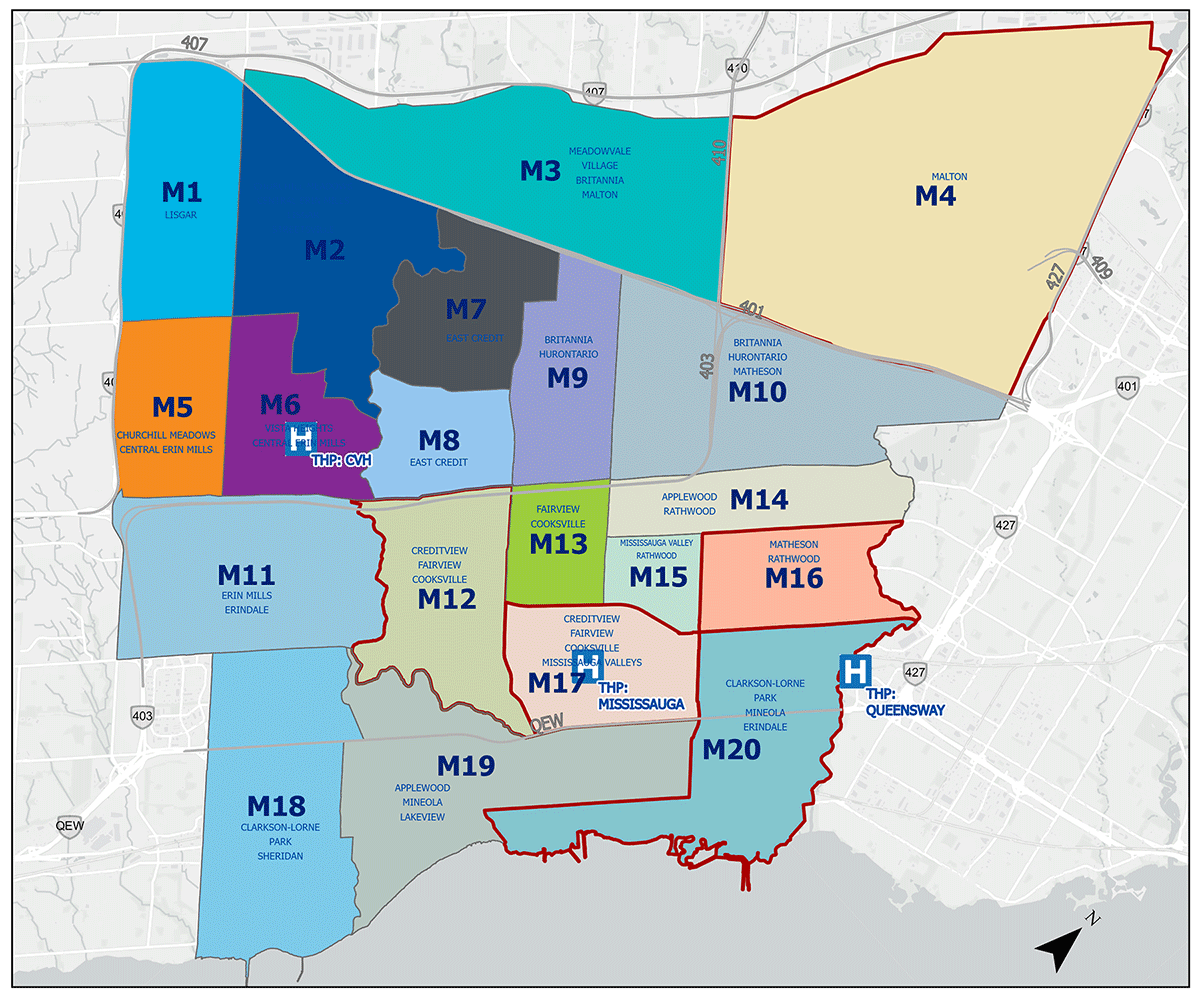
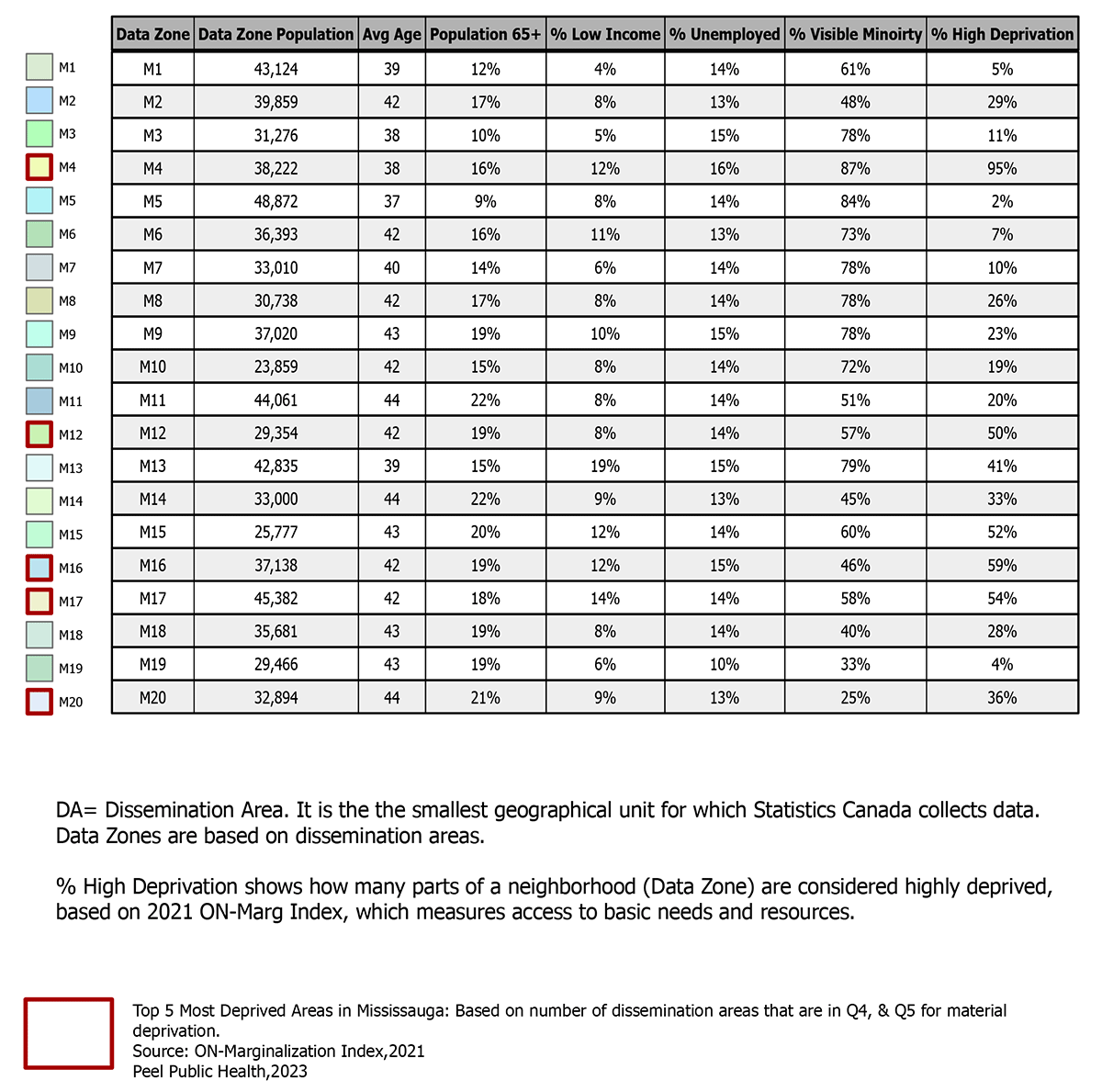
For more information or insights please visit: https://moht.ca/community-tool.html
Definitions:
Data Zones: are custom-built geographic units. The data zones utilize census tracts as building blocks. In the region of Peel, there are 40 data zones, of which 20 are within Mississauga.
High Deprivation: Deprivation is based on indicators related to income, education, housing quality and familial structure within a given area and were used as a proxy for socioeconomic status. High Deprivation represents areas with the most deprivation.
Since the tool’s launch, we have added new data on Premature Mortality—an important health indicator that measures the deaths of individuals under the age of 75, that could have been prevented with effective treatment, timely care, and interventions addressing social determinants of health. By combining this new data with existing sociodemographic and health information, we can gain deeper insights into our community’s health needs. For instance, the average premature mortality rate for females in Peel from 2000 to 2020 was at 179 per 100,000, while for males, was notably higher at 287 per 100,000. With this tool, we can identify the areas where various population segments are most impacted and examine contributing factors, such as low income and cancer screening rates, which are linked to poorer health outcomes. Our aim is to harness this data to uncover opportunities for intervention and proactive care, ultimately driving better health outcomes for everyone.
Recognizing that health outcomes are shaped by socioeconomic factors, Trillium Health Partners, as part of its commitment to promoting health equity, became the first hospital to integrate the Health System Inequity Metric (HSIM), based on the Relative Index of Inequality (RII), into our regular reporting. (Reference: Allen-Valley, A., Bains, S., Rosella, L. et al. Integrating equity indicators for hospital reporting metrics. Res Health Serv Reg 3, 10 (2024). https://doi.org/10.1007/s43999-024-00046-w). This allows us to monitor disparities in service use, particularly for planned surgeries and preventative care like breast cancer screening and track our progress over time.
For instance, data from our breast cancer screening program revealed that, in fiscal year 2024-25, individuals from the lowest socioeconomic areas were 4.3 times less likely to access screening services at Trillium Health Partners than those from higher-income areas. This insight is helping us identify where gaps exist and co-design initiatives with our community to close them.
A value of 1 indicates no inequity and greater than 1 indicates inequity such that living in lower socioeconomic status neighbourhoods are served less than higher socioeconomic status areas.
Trillium Health Partners remains committed to reducing inequities by embedding these population-level metrics into our planning and fostering strong community partnerships. Through data-driven solutions and collaboration, we are working to ensure equitable access to care and better health outcomes for everyone we serve.
- Mississauga is the third-largest city in Ontario and the seventh largest in Canada (2021 Census).
- Trillium Health Partners’ core catchment areas include Northwest Mississauga, East Mississauga, Southwest Mississauga, and South Etobicoke, serving a community of approximately 800,000 residents.
- Of the areas we serve, the top 3 FSAs are, L5M (Streetsville), L5N (Lisgar) and L5B (Cooksville).
- As a regional hospital, with 14 regional specialty programs, Trillium Health Partners serves a broader community of 2.2 million in West Toronto, Peel, and Halton and in some cases beyond
- 75-82% of Mississauga residents came to Trillium Health Partners for emergency care, day surgery, and/or inpatient care this year
- Residents in East and Southwest Mississauga tend to be older and have a higher incidence of chronic diseases. There is a substantial number of recent immigrants, and this population shows a higher material deprivation score (indicating lower socioeconomic status). These neighborhoods exhibit increased use of health care services, presenting an opportunity to enhance overall population health outcomes.
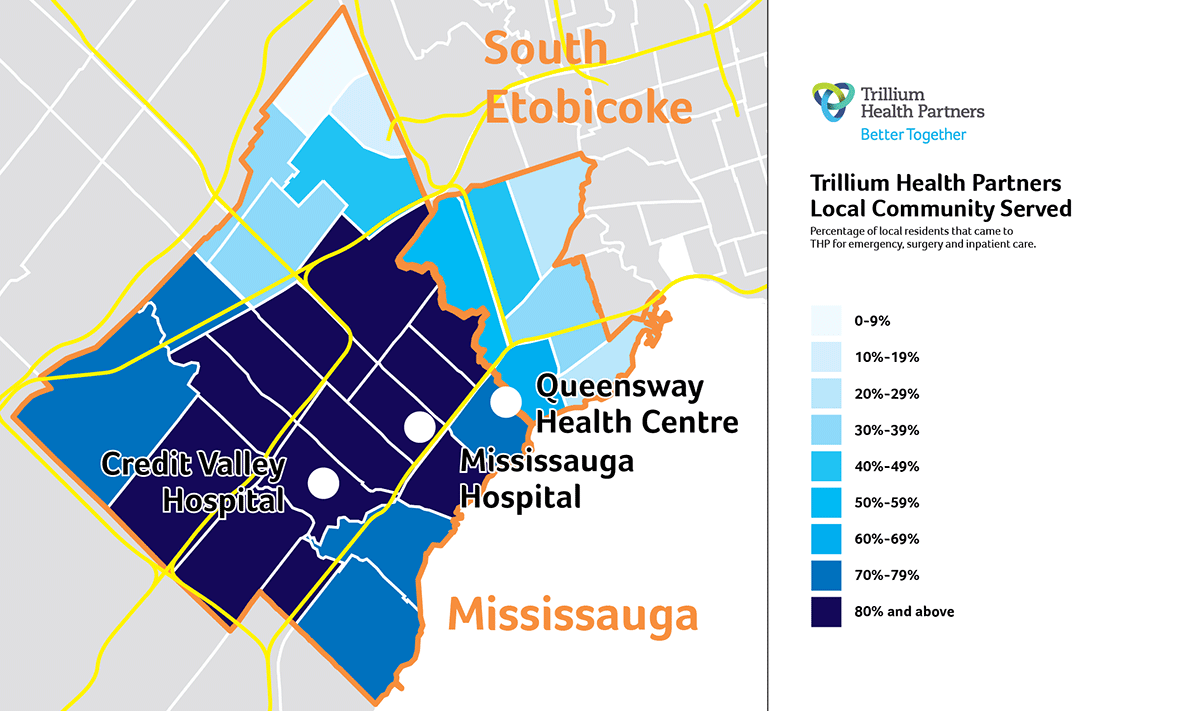
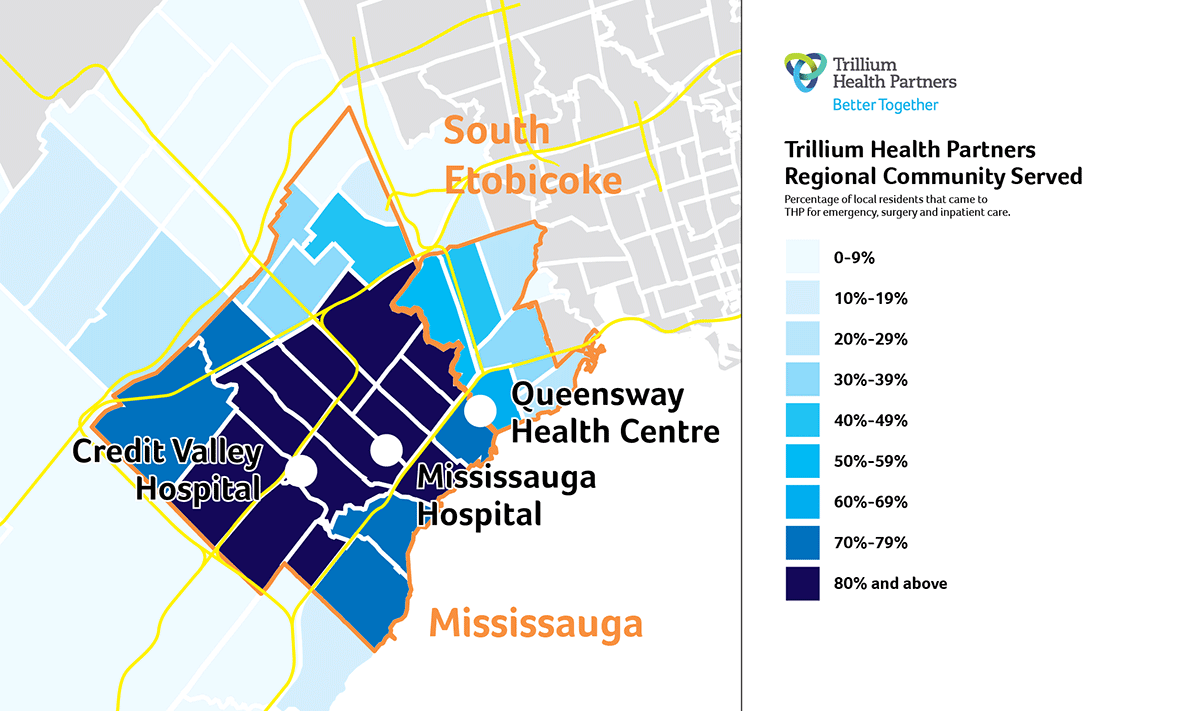
In fiscal year 2024–25, Trillium Health Partners made important progress in advancing a new kind of health care for a healthier community, while continuing to manage consistently high demand for patient care.
This period brought significant and ongoing pressures across the hospital sector, including growing community needs and rising care delivery costs. Cost pressures were driven by inflation (including higher costs for compensation, supplies, drugs) and increased patient care needs and complexity.
Trillium Health Partners remained focused on prudent financial management and stewardship of resources, active planning and forecasting, and execution of its operational plan. The hospital rigorously applies performance benchmarking to drive efficiency and is focused on partnerships to ensure care is delivered at the right time, in the right place, with the highest quality and value.
The hospital continued to improve access to care by investing in programs, infrastructure, and partnerships that meet the evolving needs of the community. This included expanding THP@home to support over 1,000 patients in the last year alone, creating 55 new acute care beds at the Credit Valley Hospital by opening the Trillium Health Partners–University Health Network Reactivation Care Centre, and launching a Capacity Command Centre with Ontario Health and Mississauga Health to optimize capacity and improve patient flow. Investments were also made in clinical equipment, digital tools, and IT infrastructure, as well as in a new integrated scheduling, human resources, and payroll system to better support and anticipate workforce needs.
Trillium Health Partners achieved important capacity-building milestones by advancing Trillium HealthWorks, Canada’s largest health infrastructure renewal project. This included breaking ground on the future home of The Gilgan Family Queensway Health Centre and constructing a new parking garage at the Mississauga Hospital site, paving the way for The Peter Gilgan Mississauga Hospital and the Shah Family Hospital for Women and Children.
Due to the ongoing unfunded capacity related cost pressures, Trillium Health Partners’ financial results of operations reflect a moderate deficit of approximately 2.1 per cent of total hospital revenues for the year ending March 31, 2025. The hospital remains in a strong working capital position, thanks to a history of prudent financial stewardship.
Trillium Health Partners continues to work with the Ministry of Health and other government and community partners to ensure investments support financial sustainability, address capacity pressures, and advance the shared commitment to local share for Trillium HealthWorks.
(in thousands of dollars) |
||
|---|---|---|
| Revenue | 2025 $ |
2024 $ |
| Ministry of Health and other ministries | 1,362,615 | 1,309,650 |
| Other agencies and patient revenues | 125,359 | 119,344 |
| Service recoveries, retail, and ancillary revenues | 176,243 | 142,780 |
| Amortization of deferred capital grants and contributions - equipment | 8,327 | 11,920 |
| Investment income | 4,617 | 10,956 |
| Special programs - Ministries of Health and Community and Social Services | 53,116 | 44,593 |
| 1,730,277 | 1,639,243 | |
| Expenses | 2025 $ |
2024 $ |
|---|---|---|
| Salaries, wages and employee benefits | 1,128,684 | 1,050,286 |
| Medical and surgical supplies | 130,453 | 115,732 |
| Drug supplies | 107,225 | 92,550 |
| Facilities, maintenance and other operating expenses | 287,974 | 270,256 |
| Amortization - equipment | 38,317 | 38,790 |
| Special programs - Ministries of Health and Community and Social Services | 53,100 | 44,578 |
| 1,745,753 | 1,612,192 |
| (Deficit) surplus of revenue over expenses before the undernoted | (15,476) | 27,051 |
| Amortization of deferred capital grants and contributions - building | 32,203 | 29,574 |
| Amortization - buildings and land improvements | (47,491) | (44,710) |
| Gain on settlement of asset retirement obligation | 1,863 | - |
| Interest on long-term debt | (8,491) | (8,553) |
| (21,916) | (23,689) | |
| (Deficit) surplus of revenue over expenses for the year | (37,392) | 3,362 |
Full audited financial statements are available at this link, or by emailing Communications and Public Affairs at Public.Affairs@thp.ca
Trillium Health Partners’ main sites include the Credit Valley Hospital, the Mississauga Hospital, and the Queensway Health Centre. Satellite sites include the Reactivation Care Centre Church, Reactivation Care Centre Buttonwood, Peel Behavioural Services, Infant & Child Development Services Peel, Renal Care Centre Watline, South Mississauga Dialysis Centre, and Ambulatory Adult Mental Health Services.
For more information on Innovation and Research
The Institute for Better Health is a key enabler for shaping a new kind of health care for a healthier community through the application of scientific expertise, innovative thinking and partnerships.
Thanks to our Community and Donors
Working with our community and donors, Trillium Health Partners Foundation raises the critical funds needed to address the highest priority needs of Trillium Health Partners.
